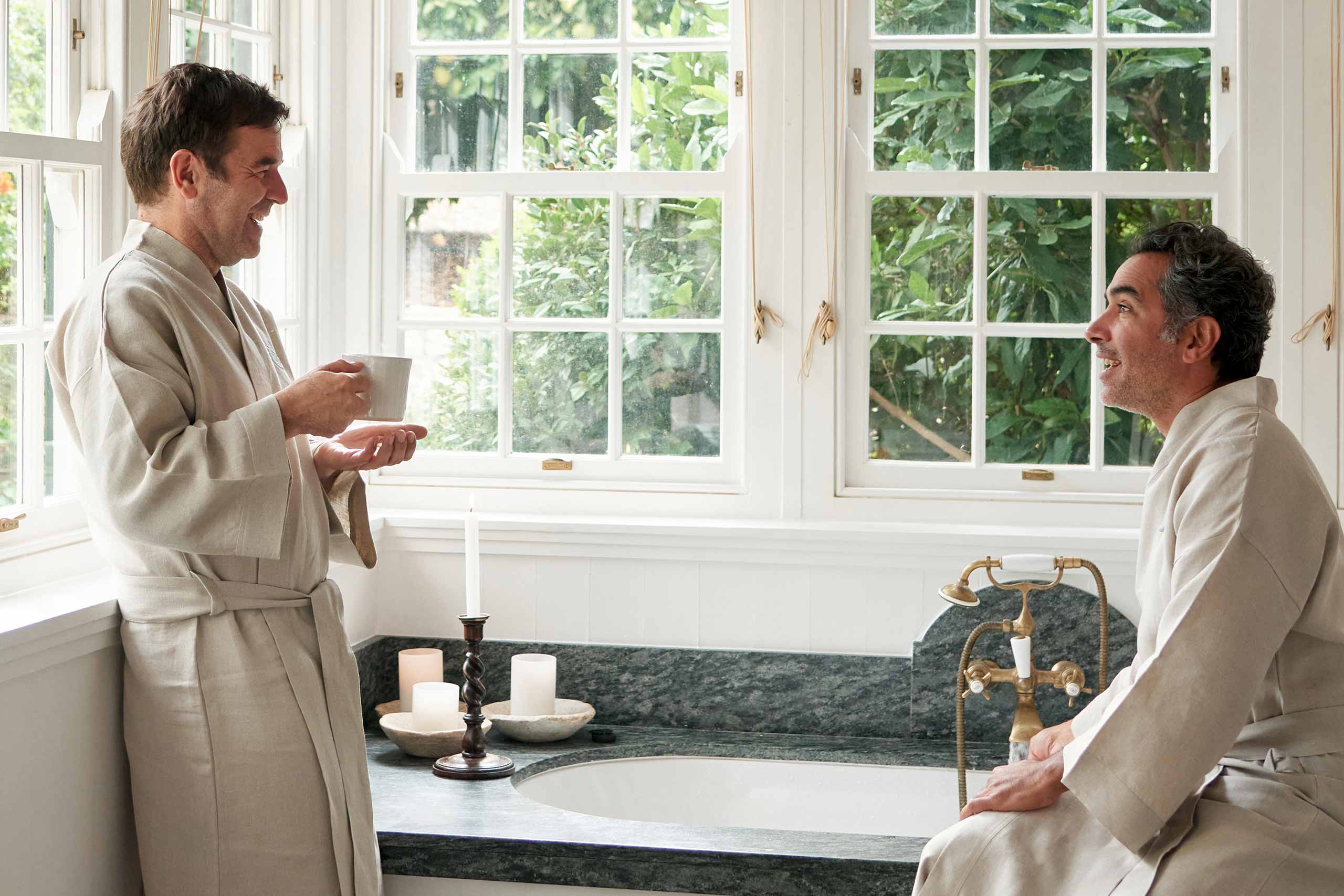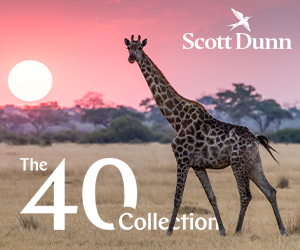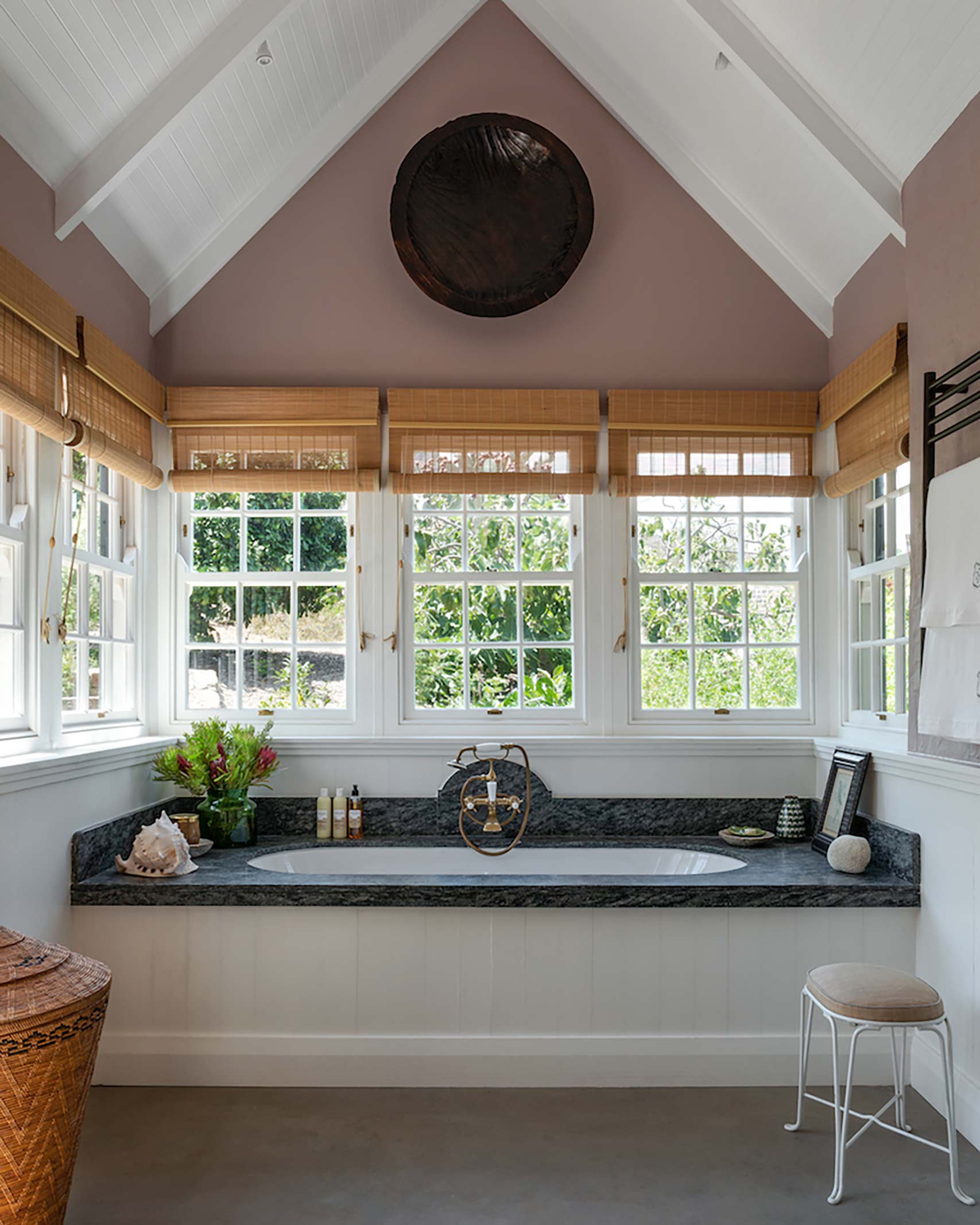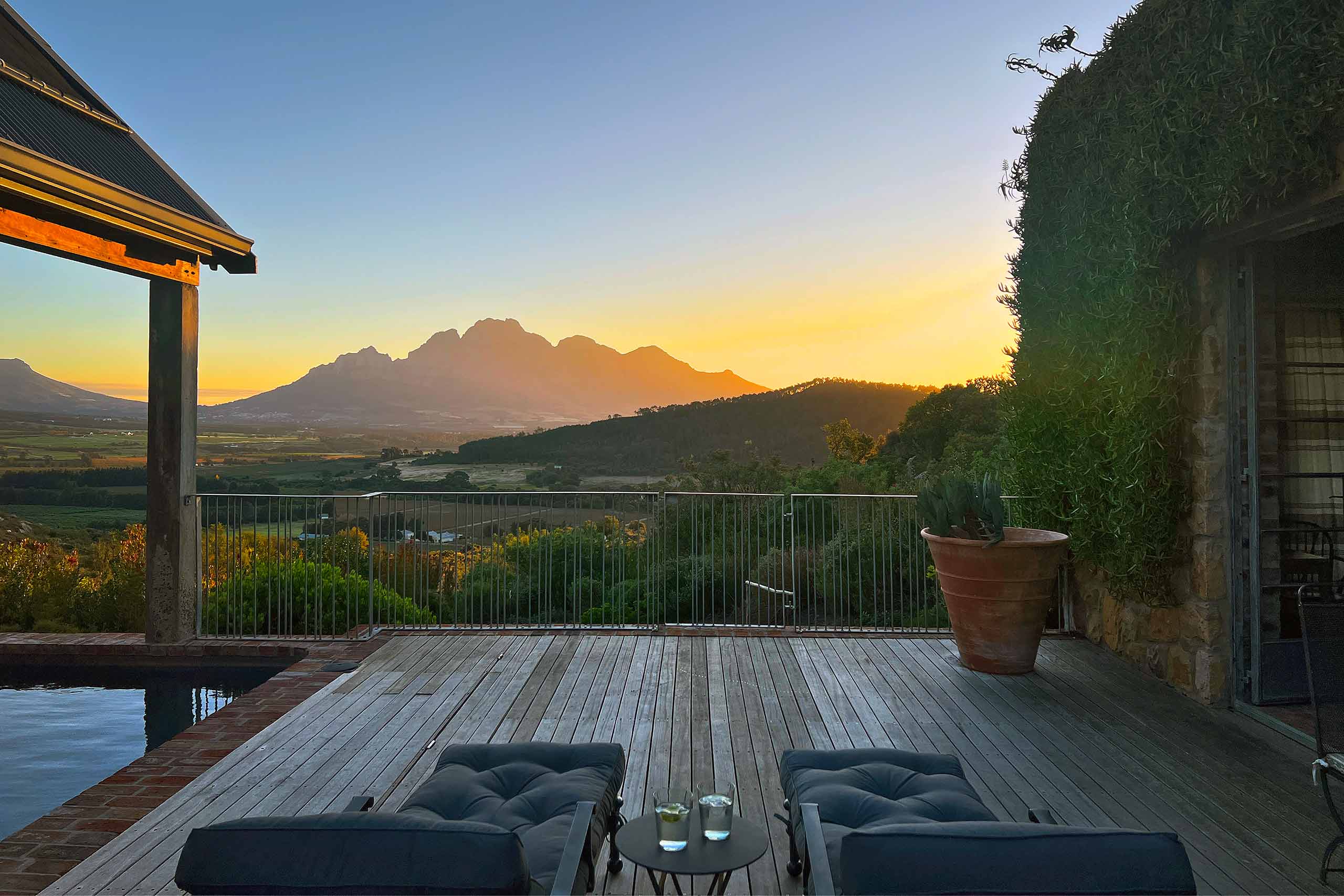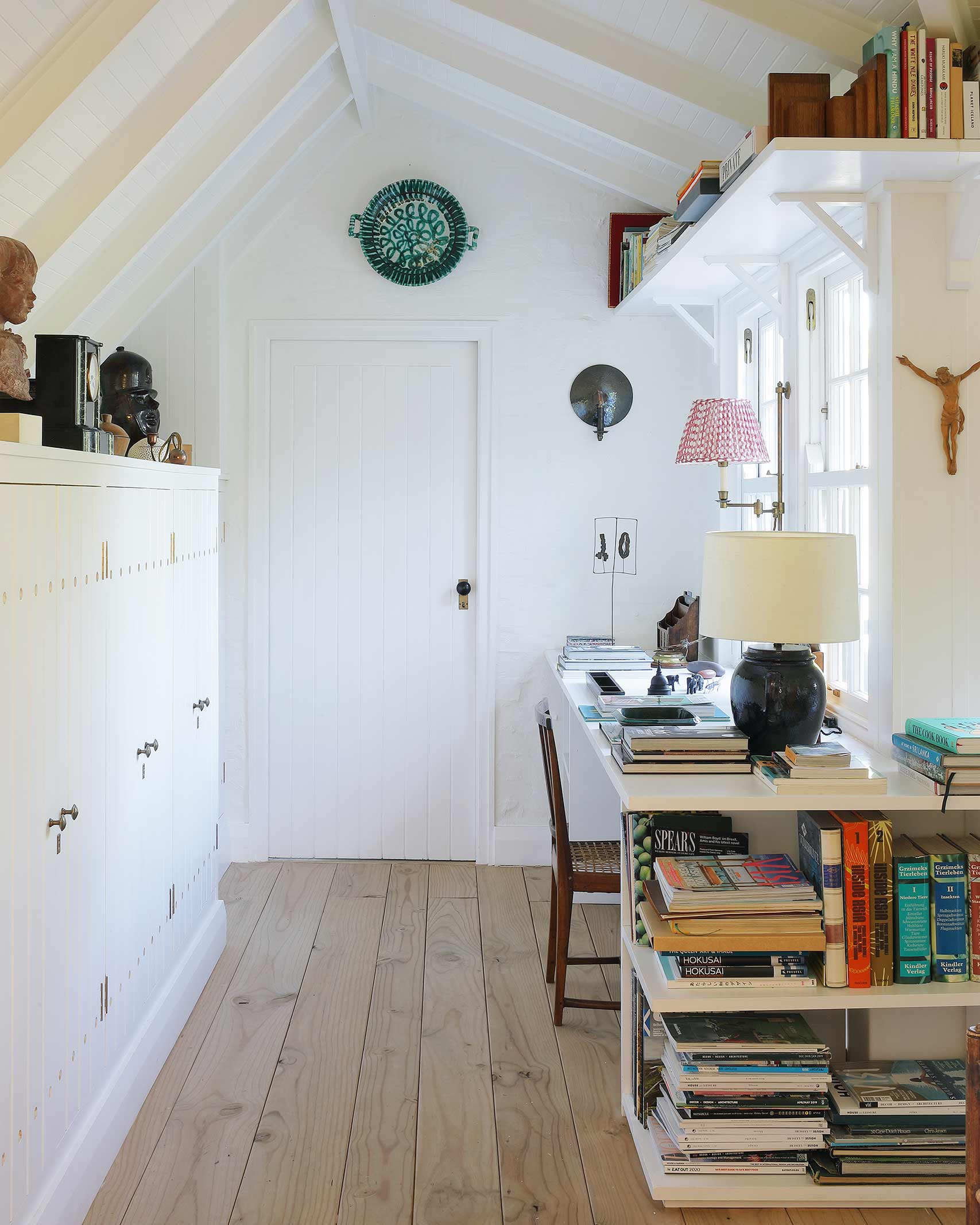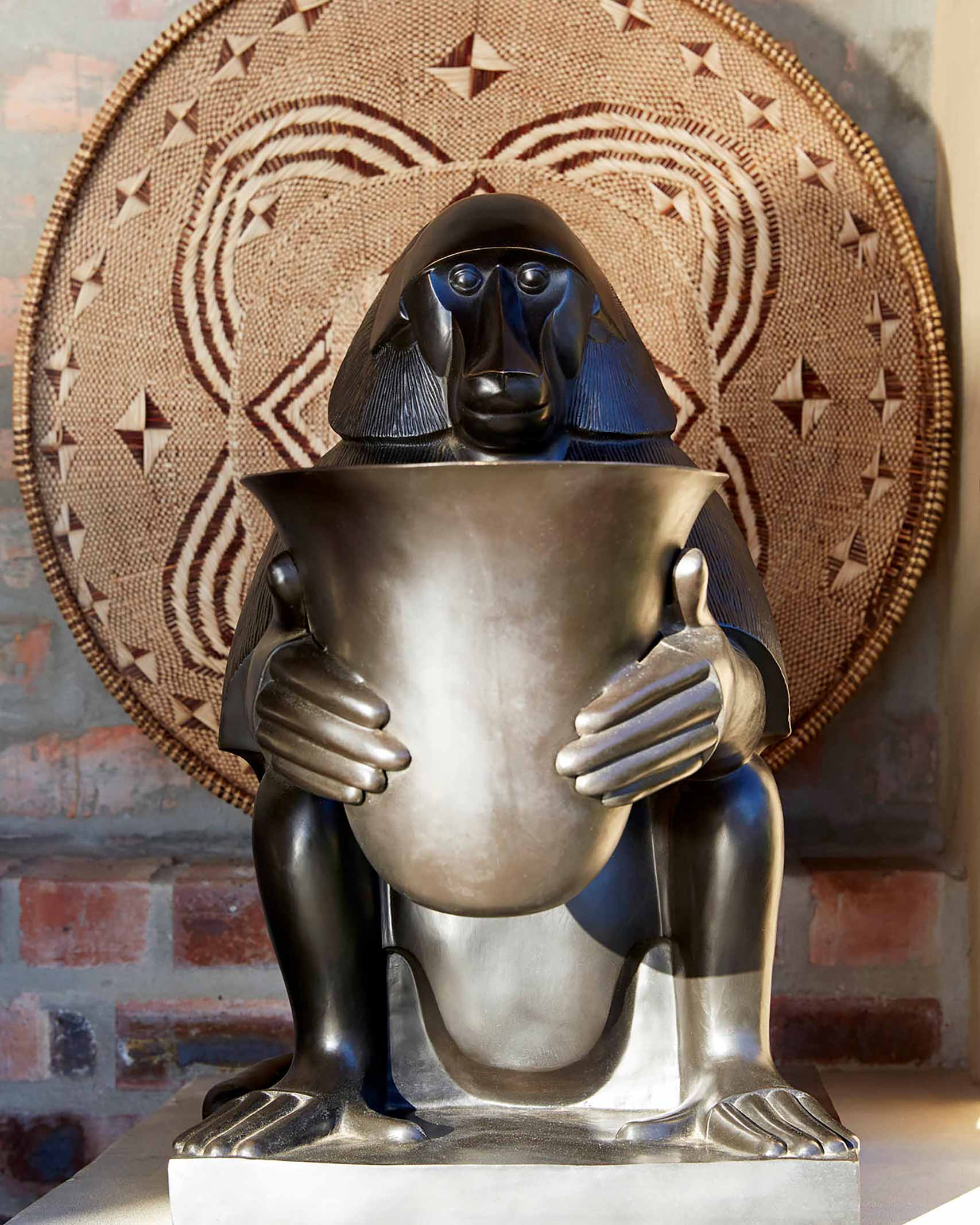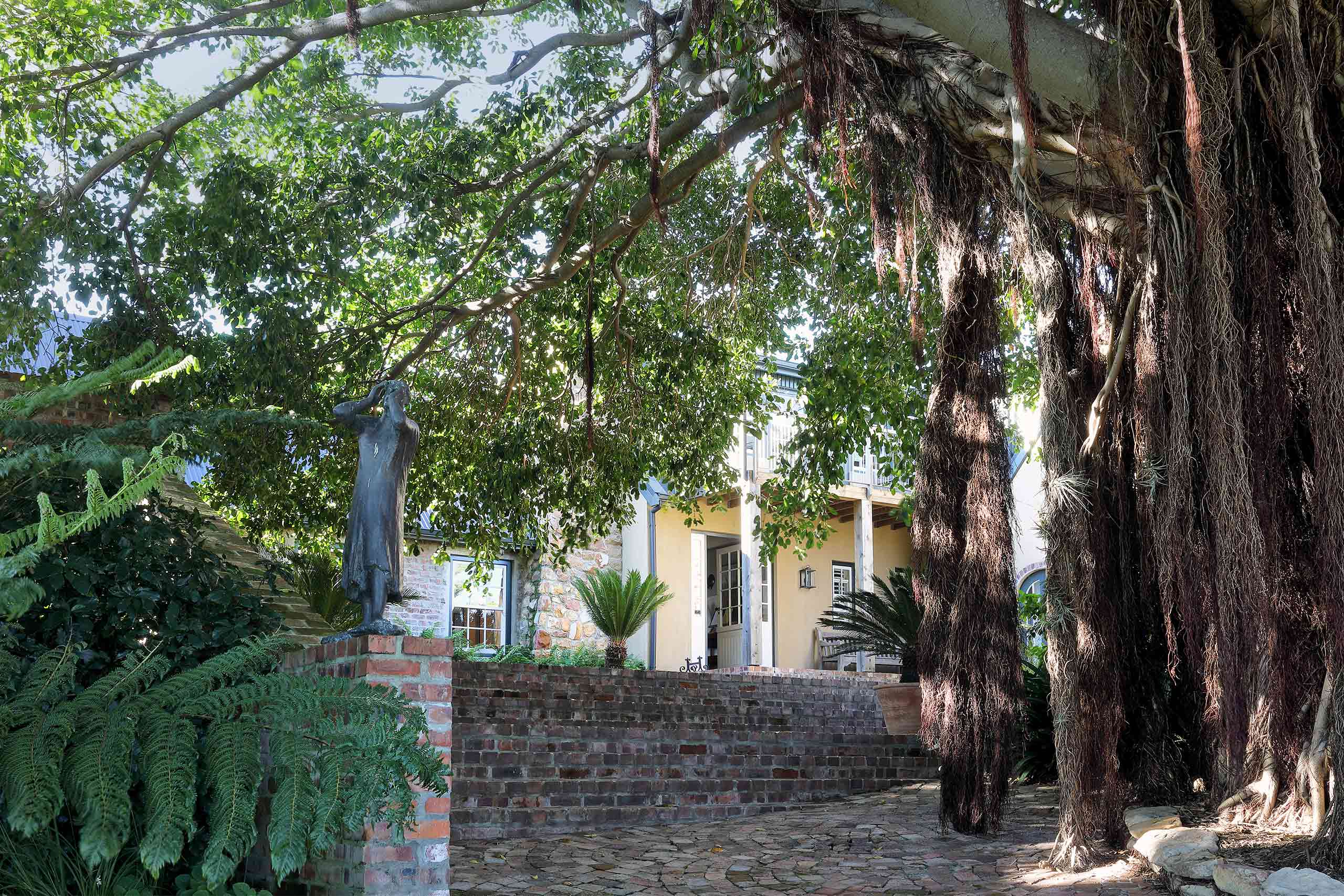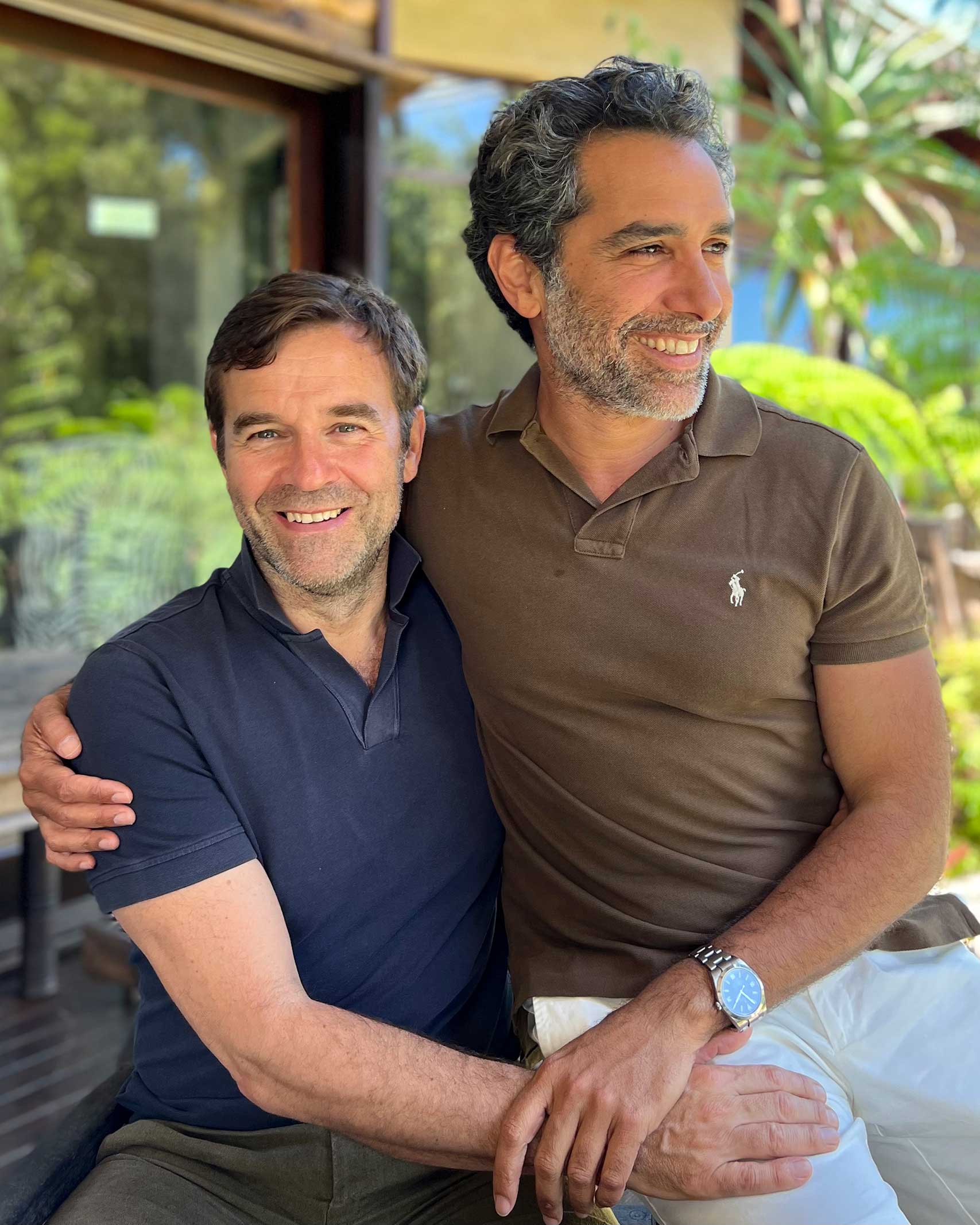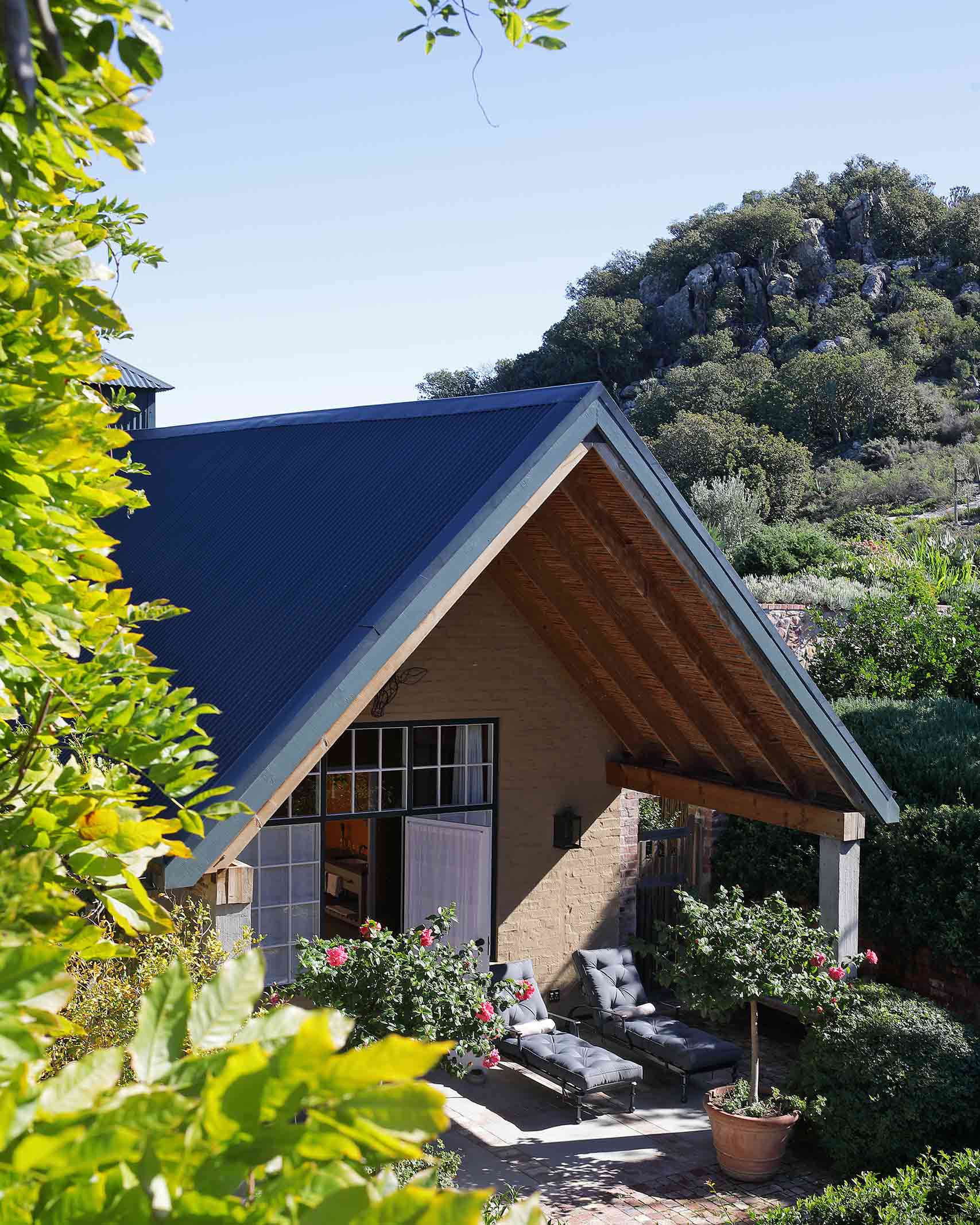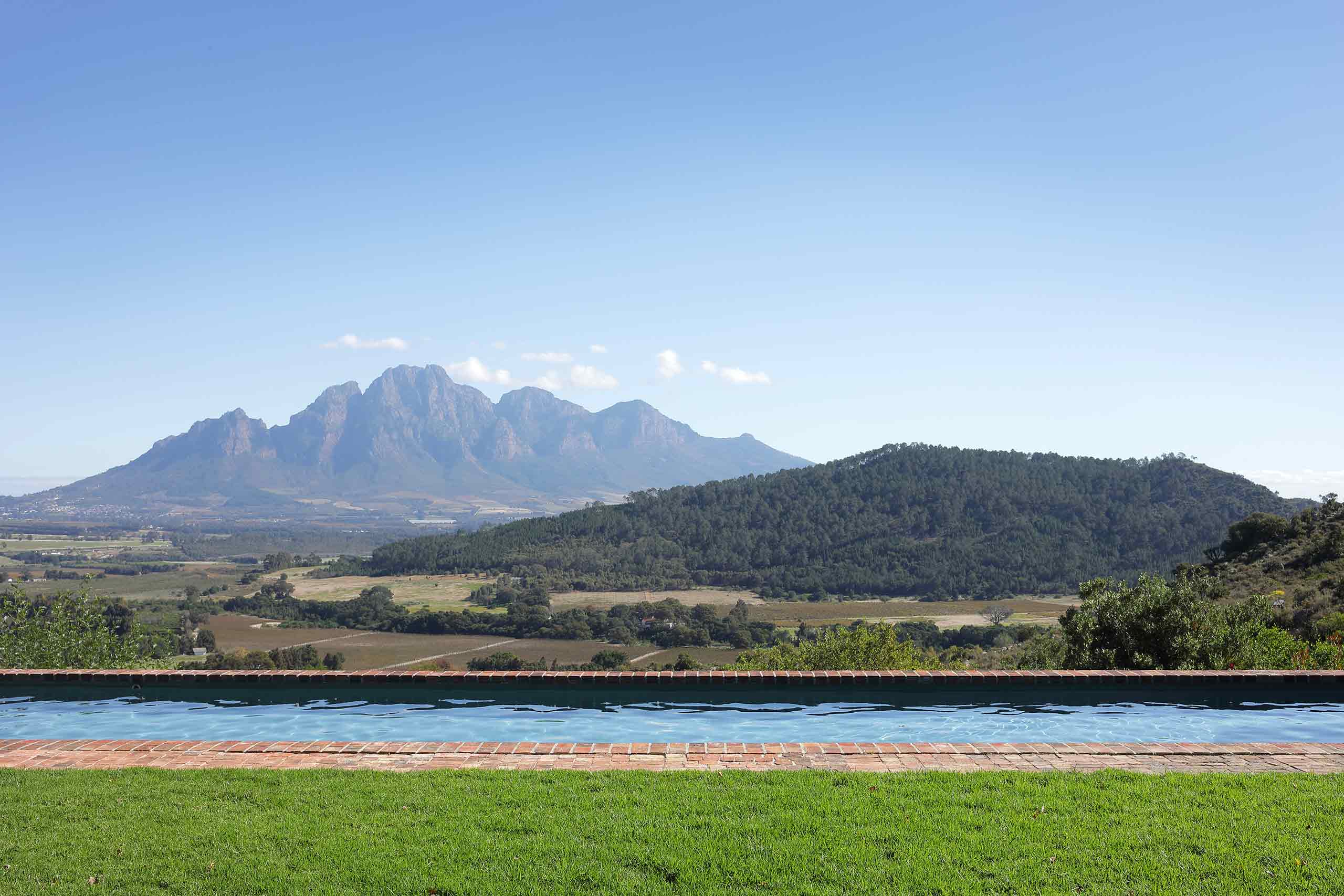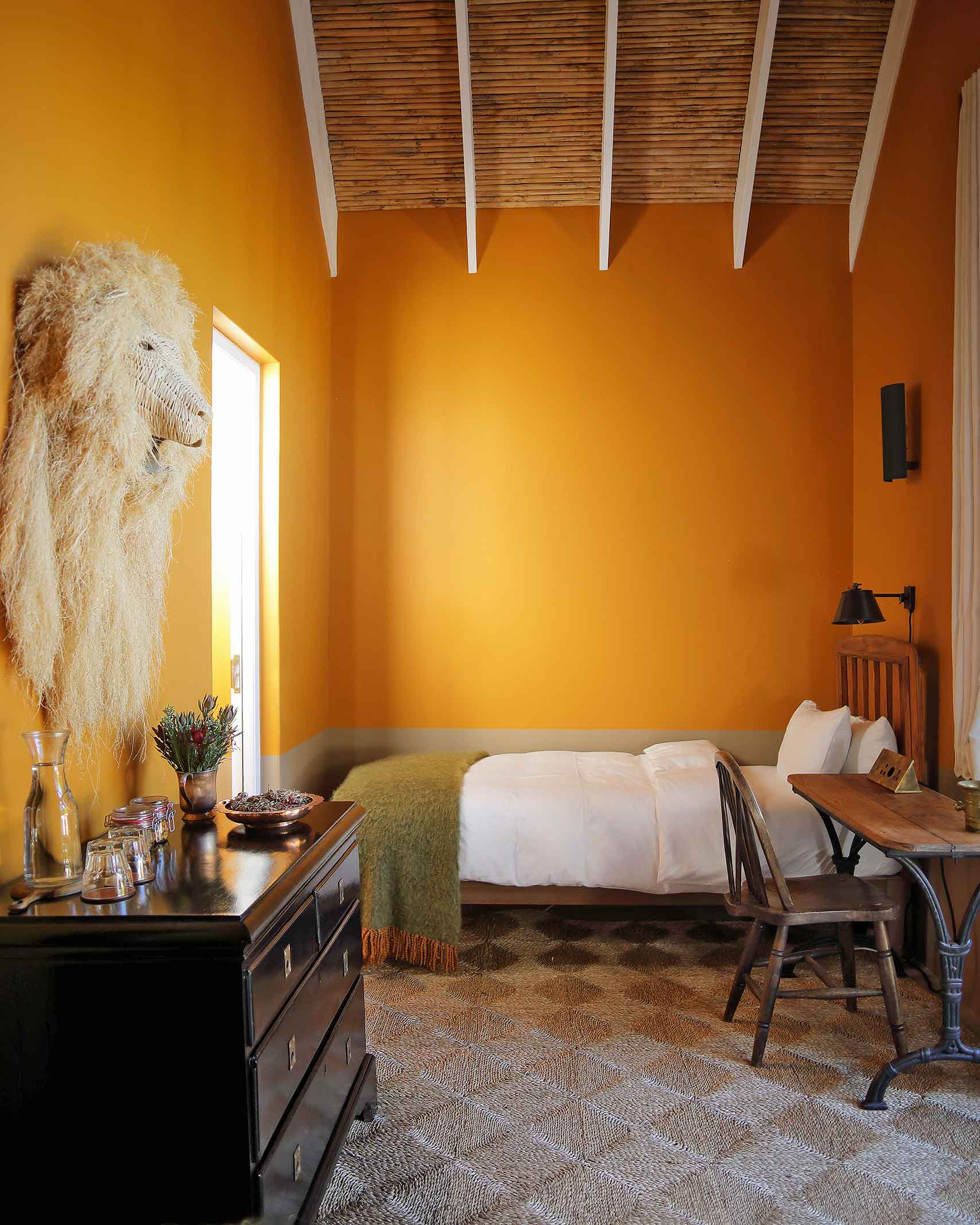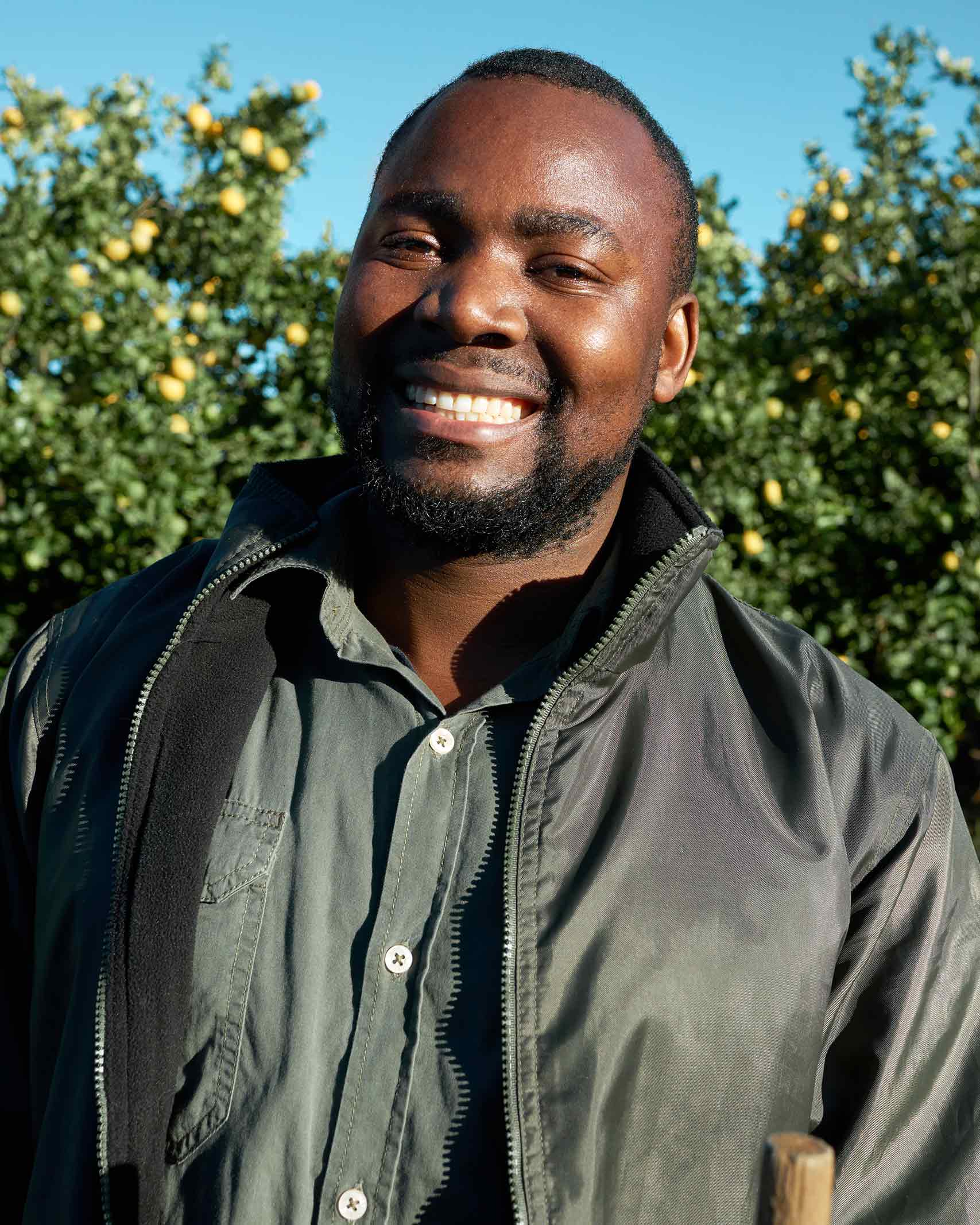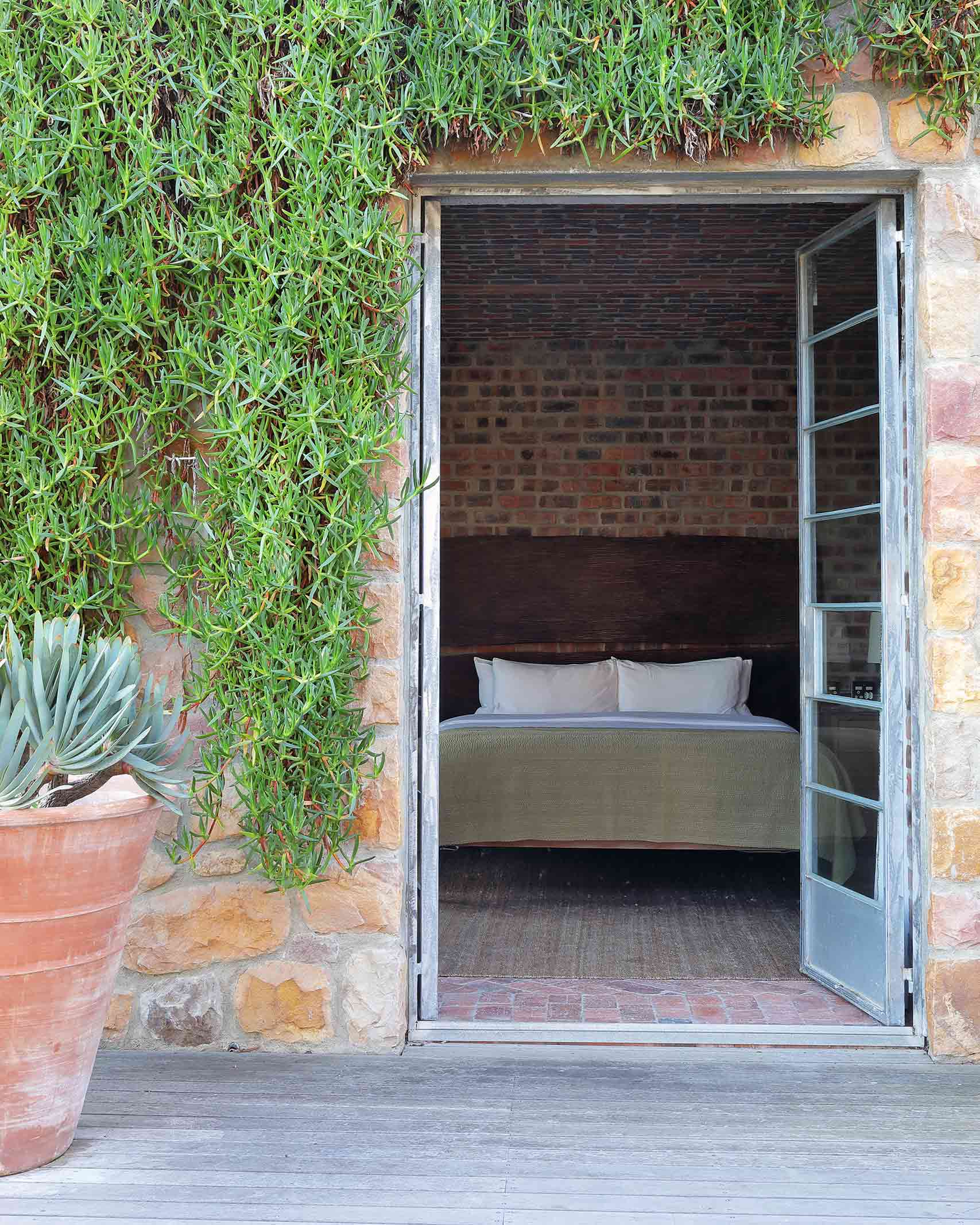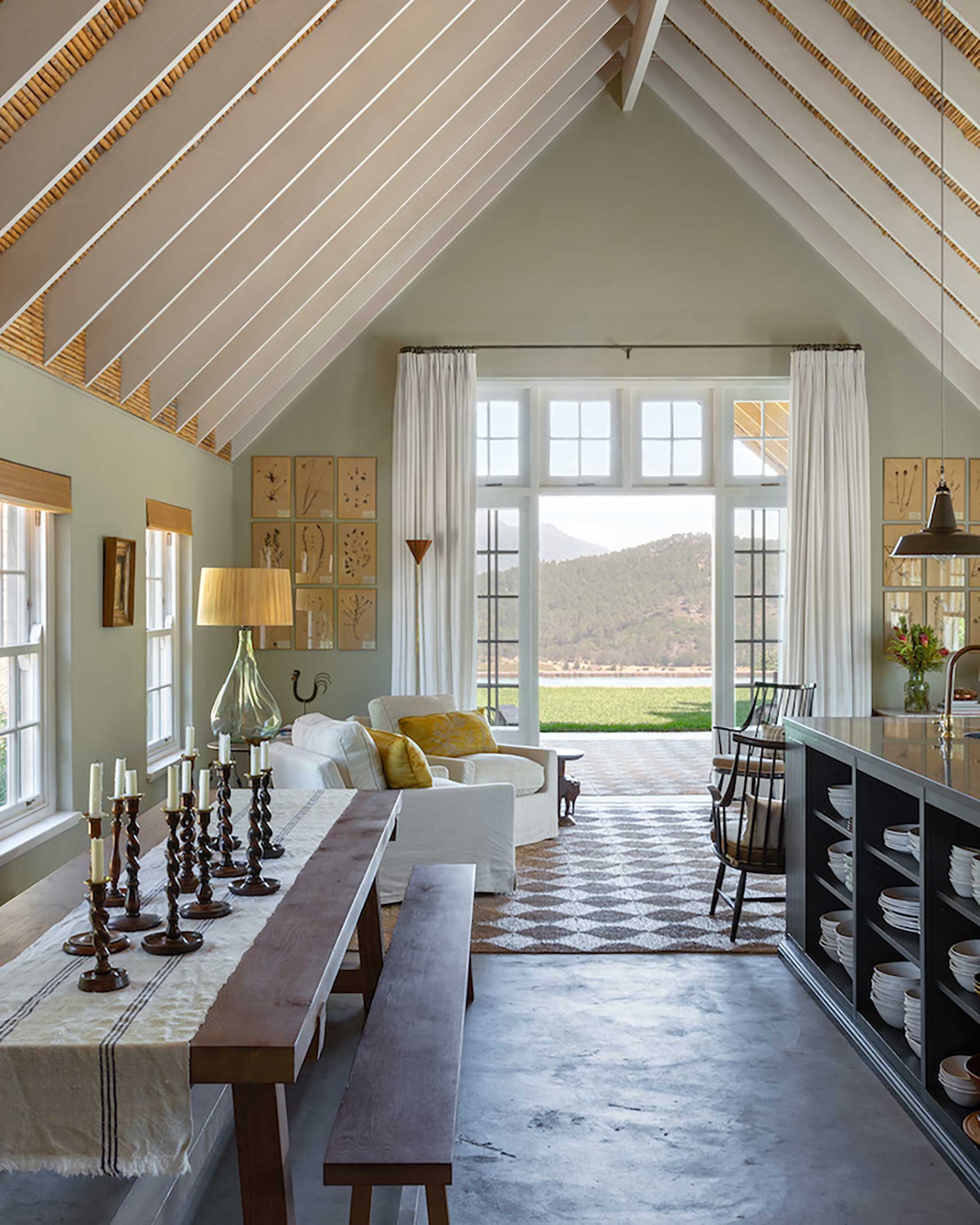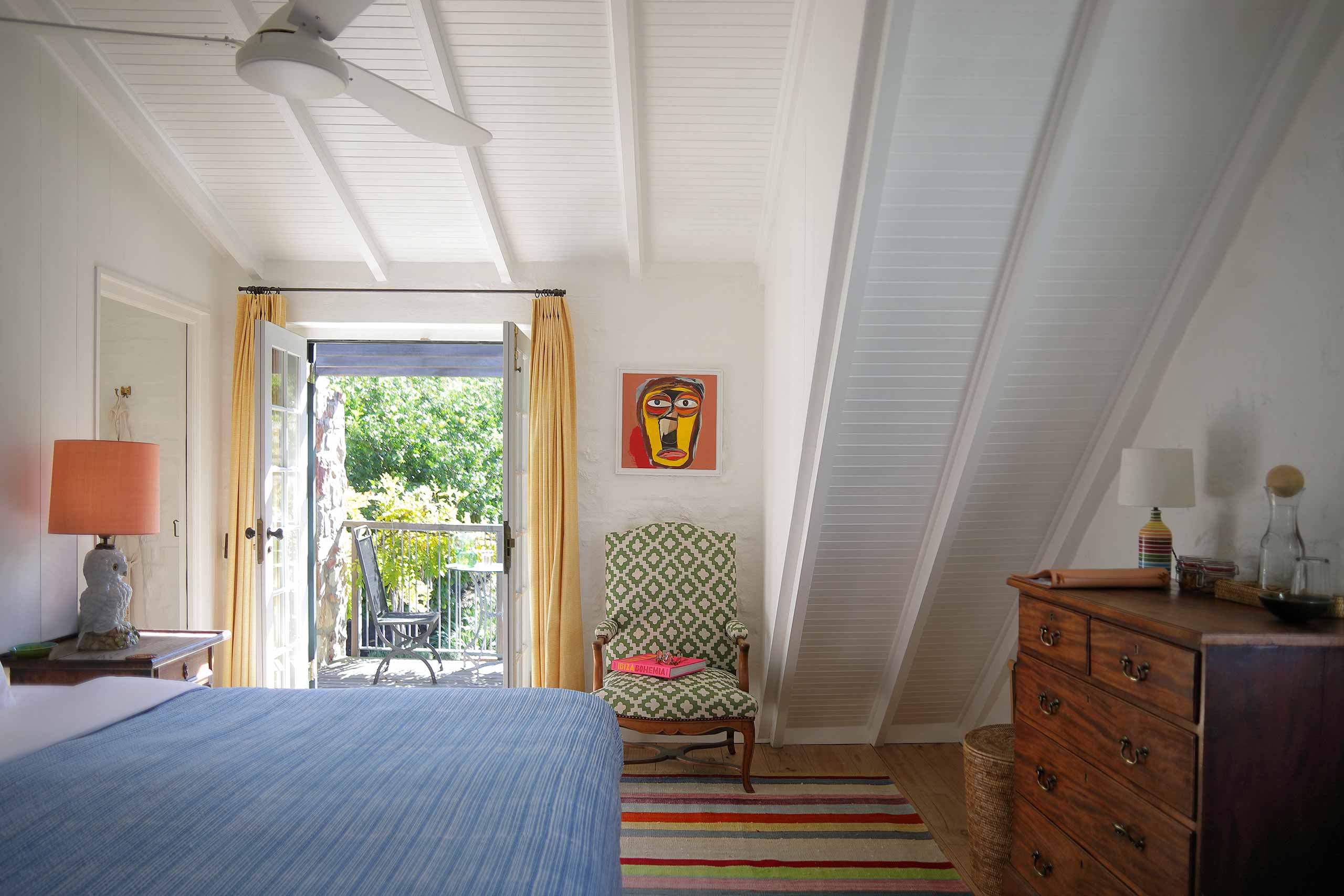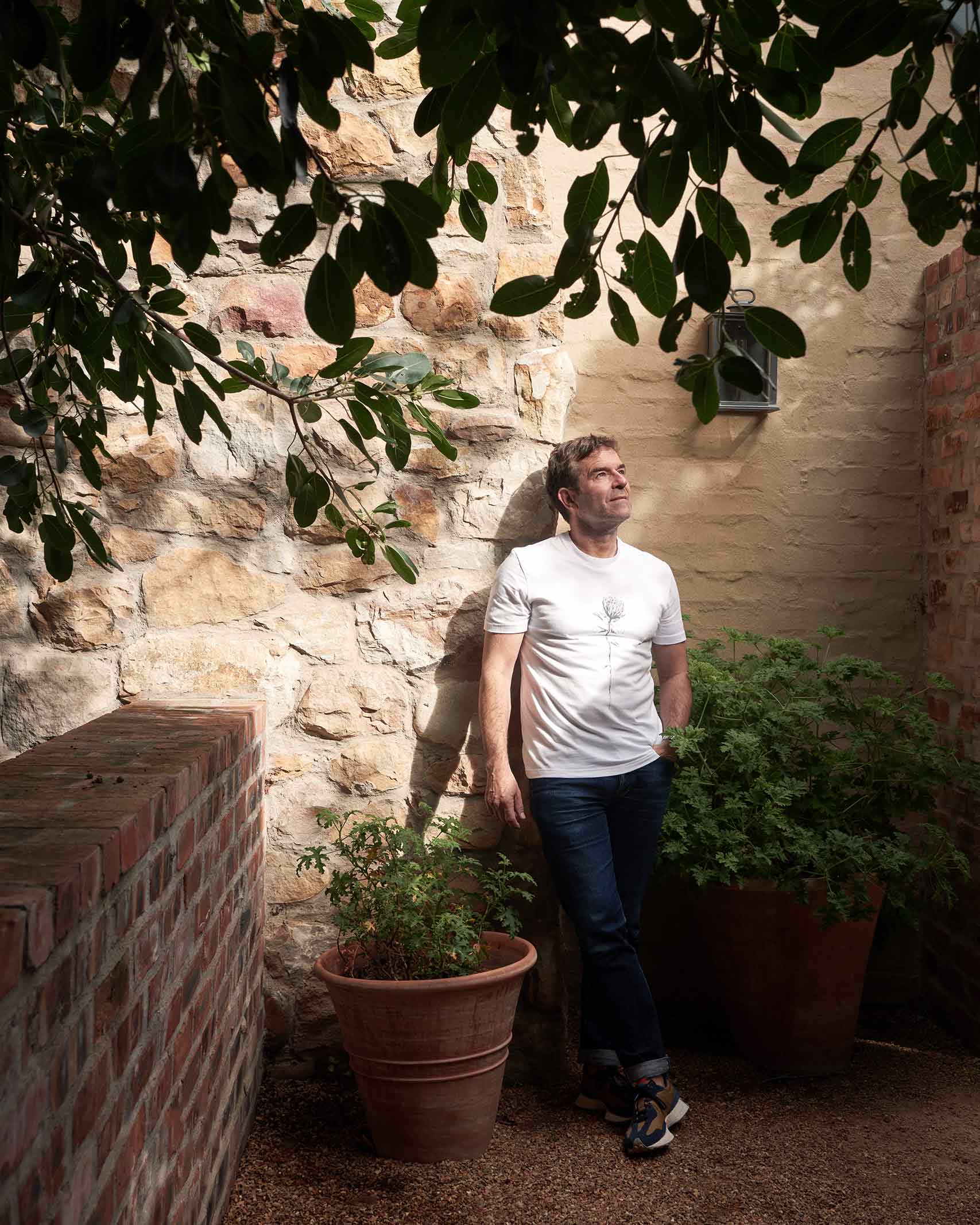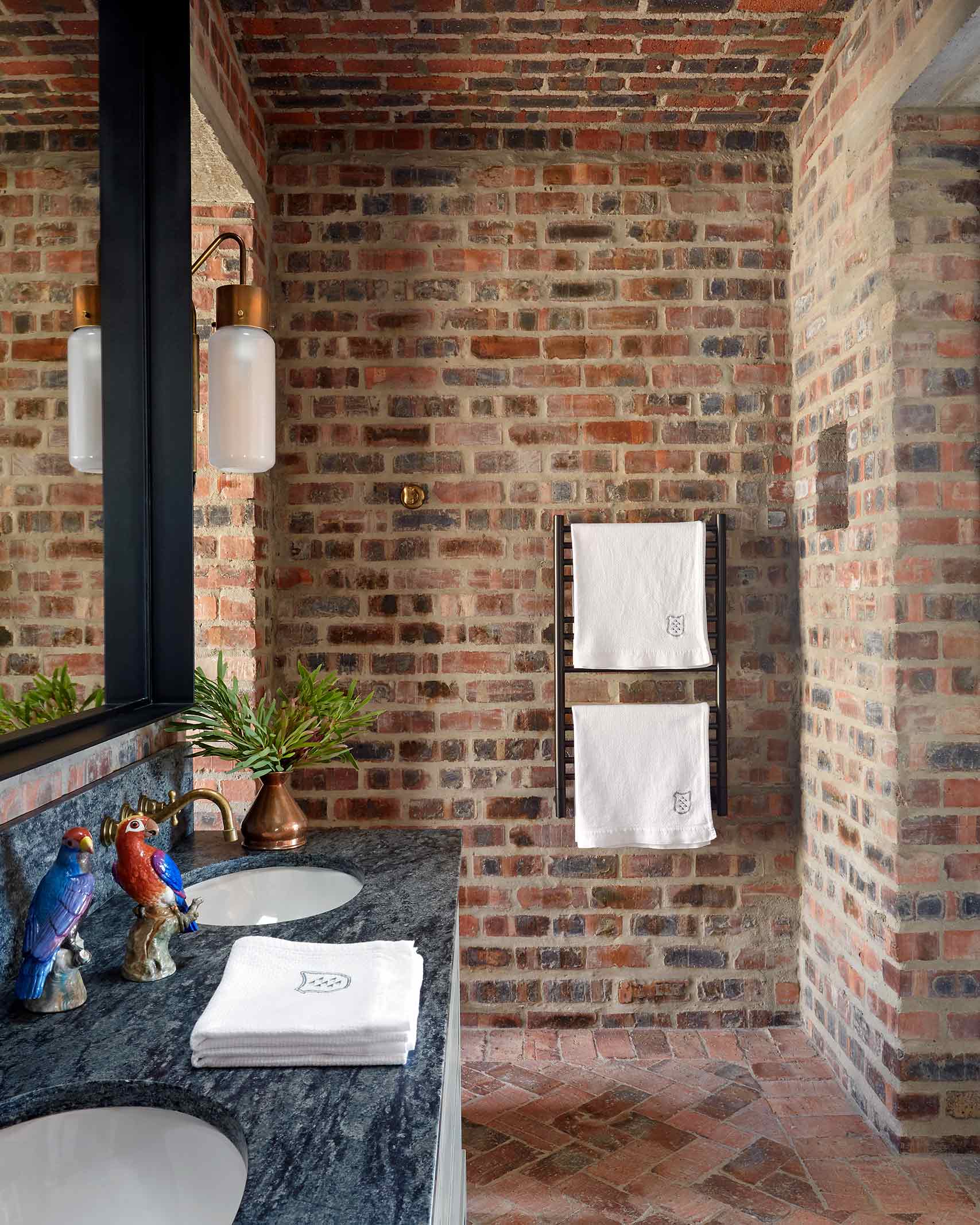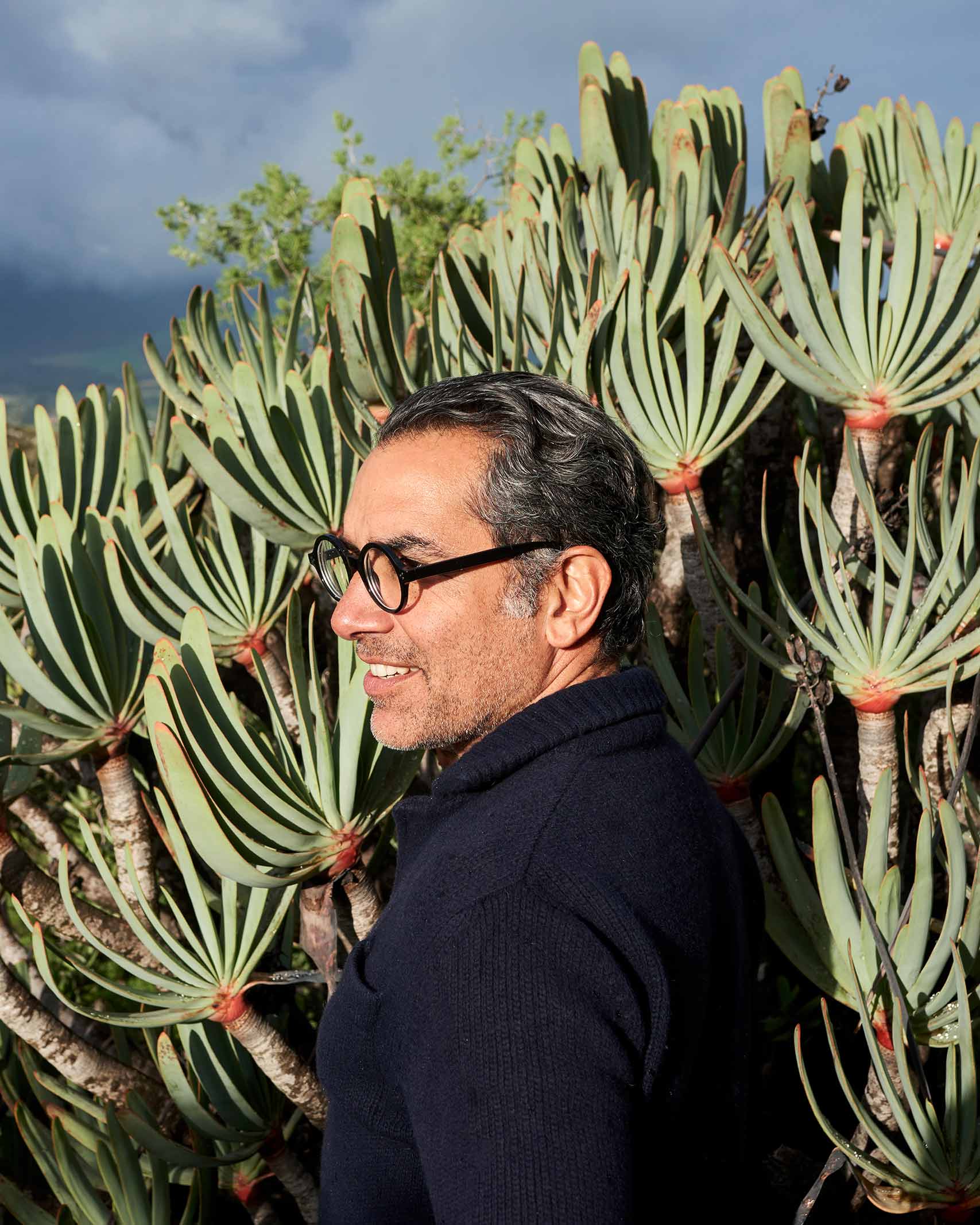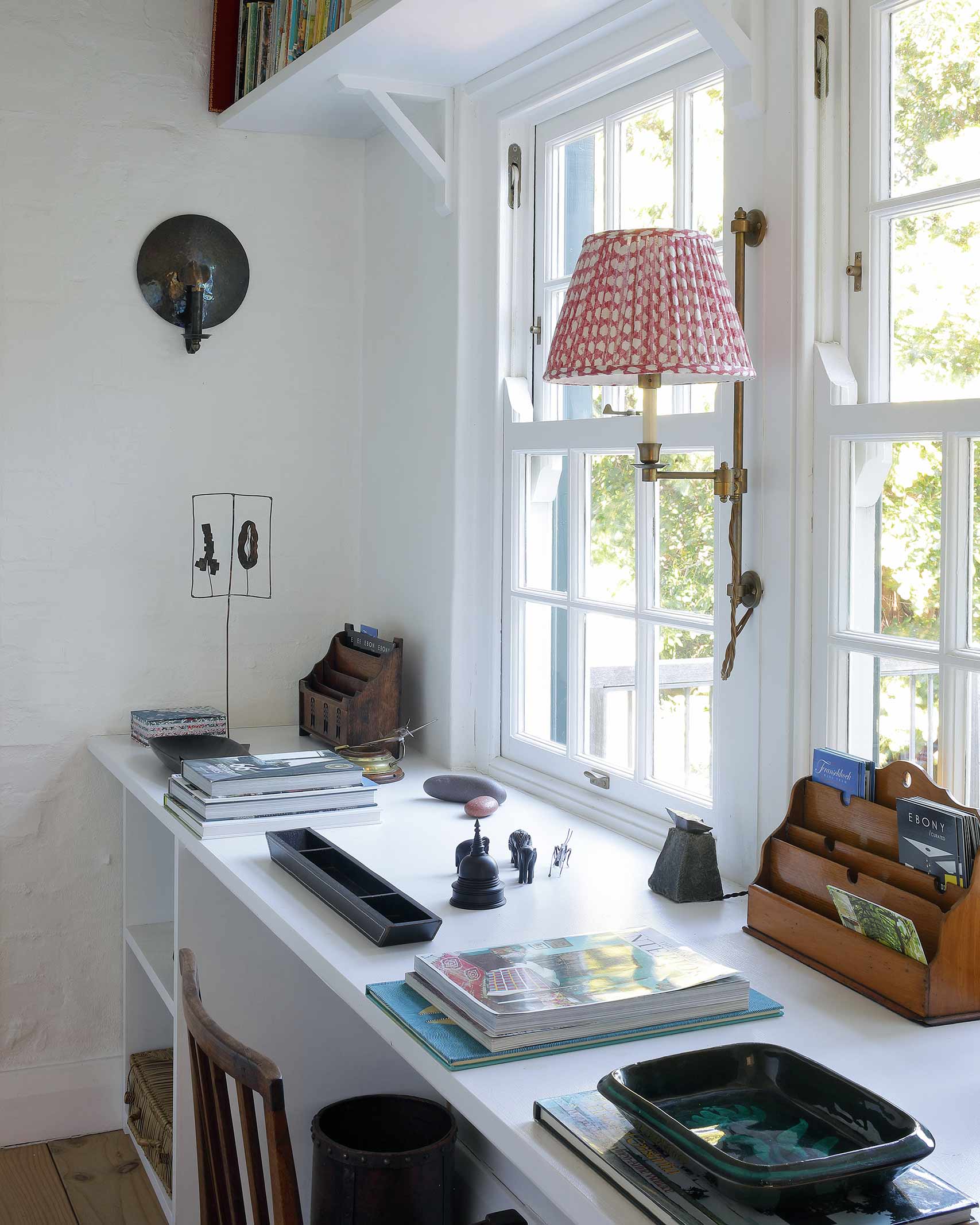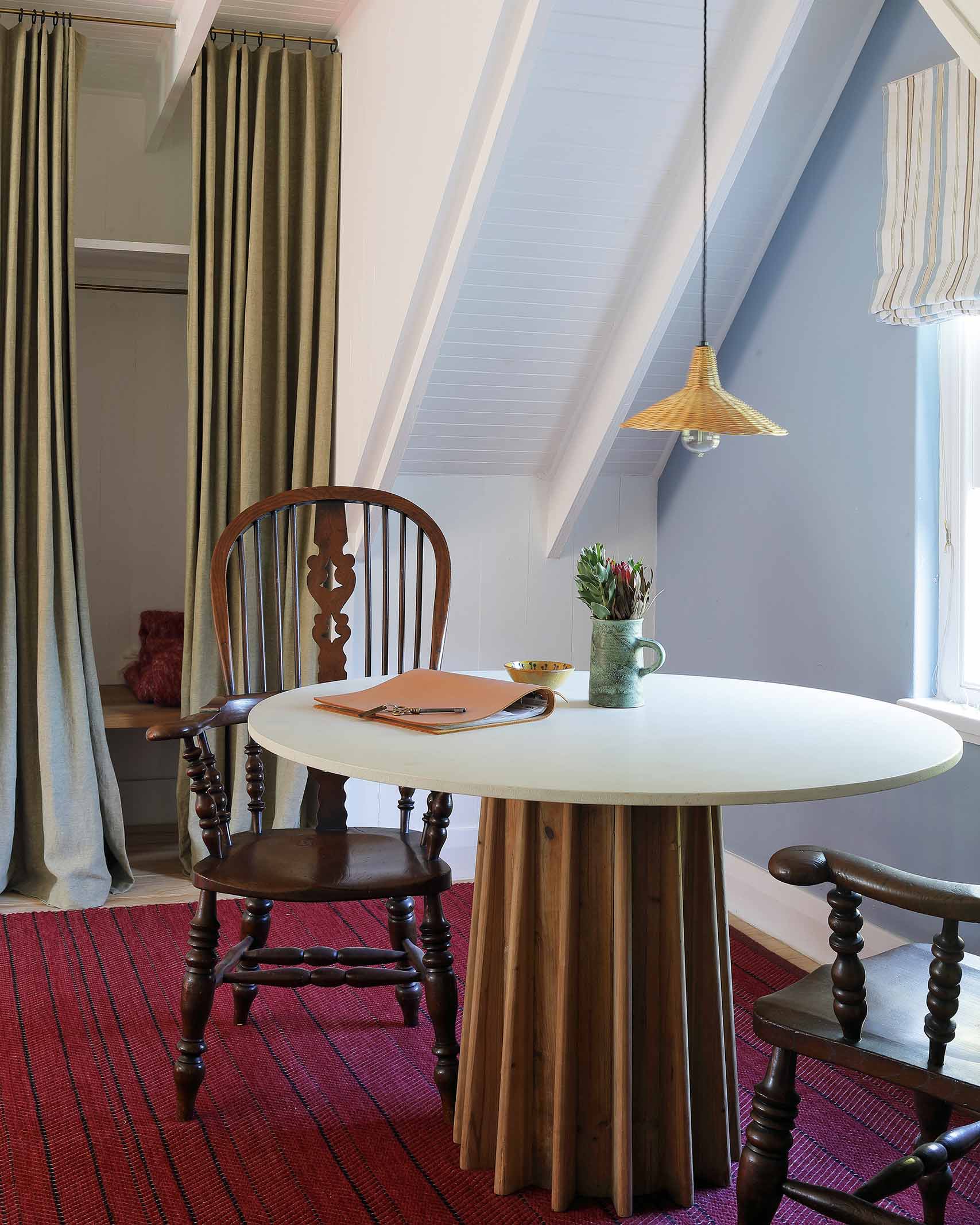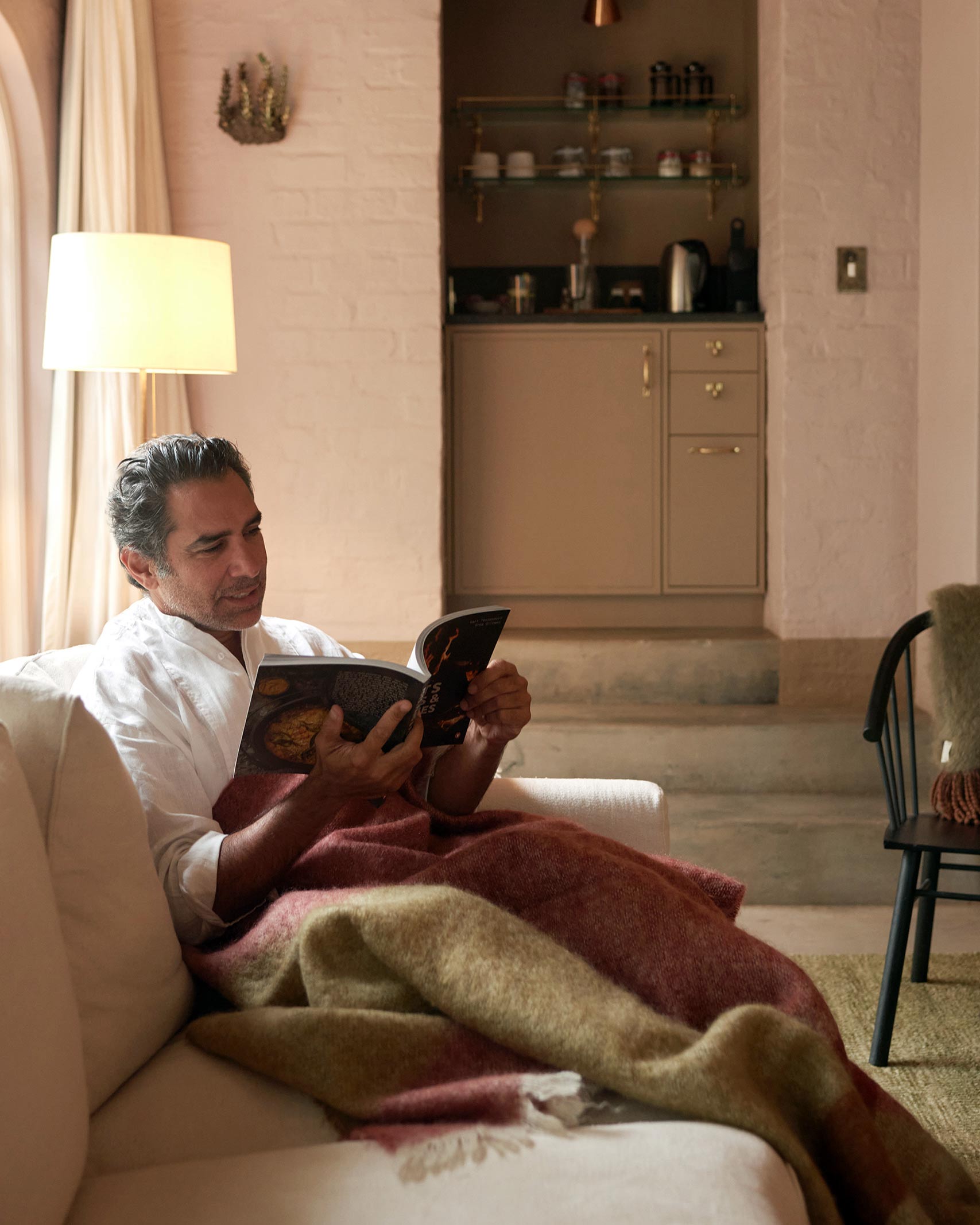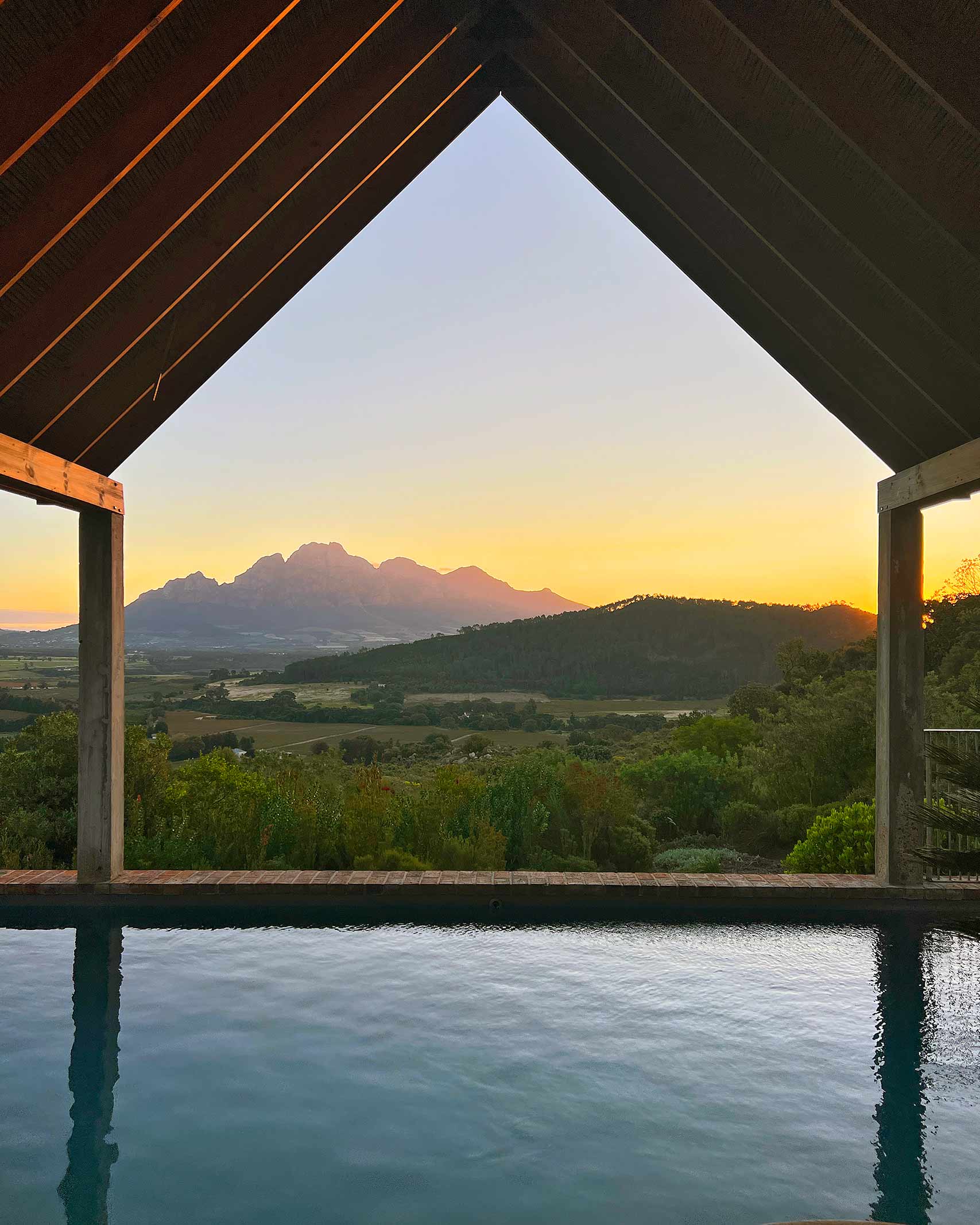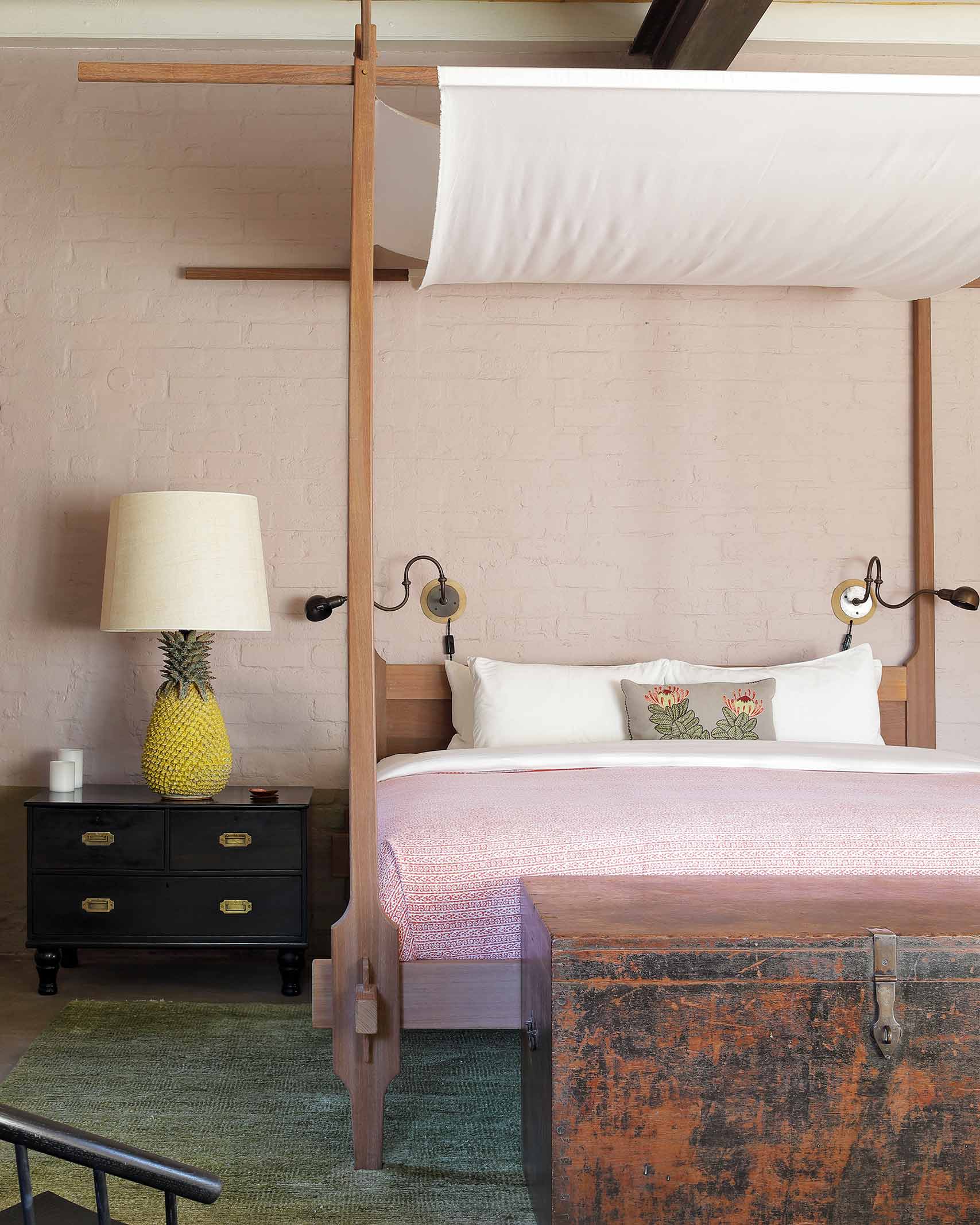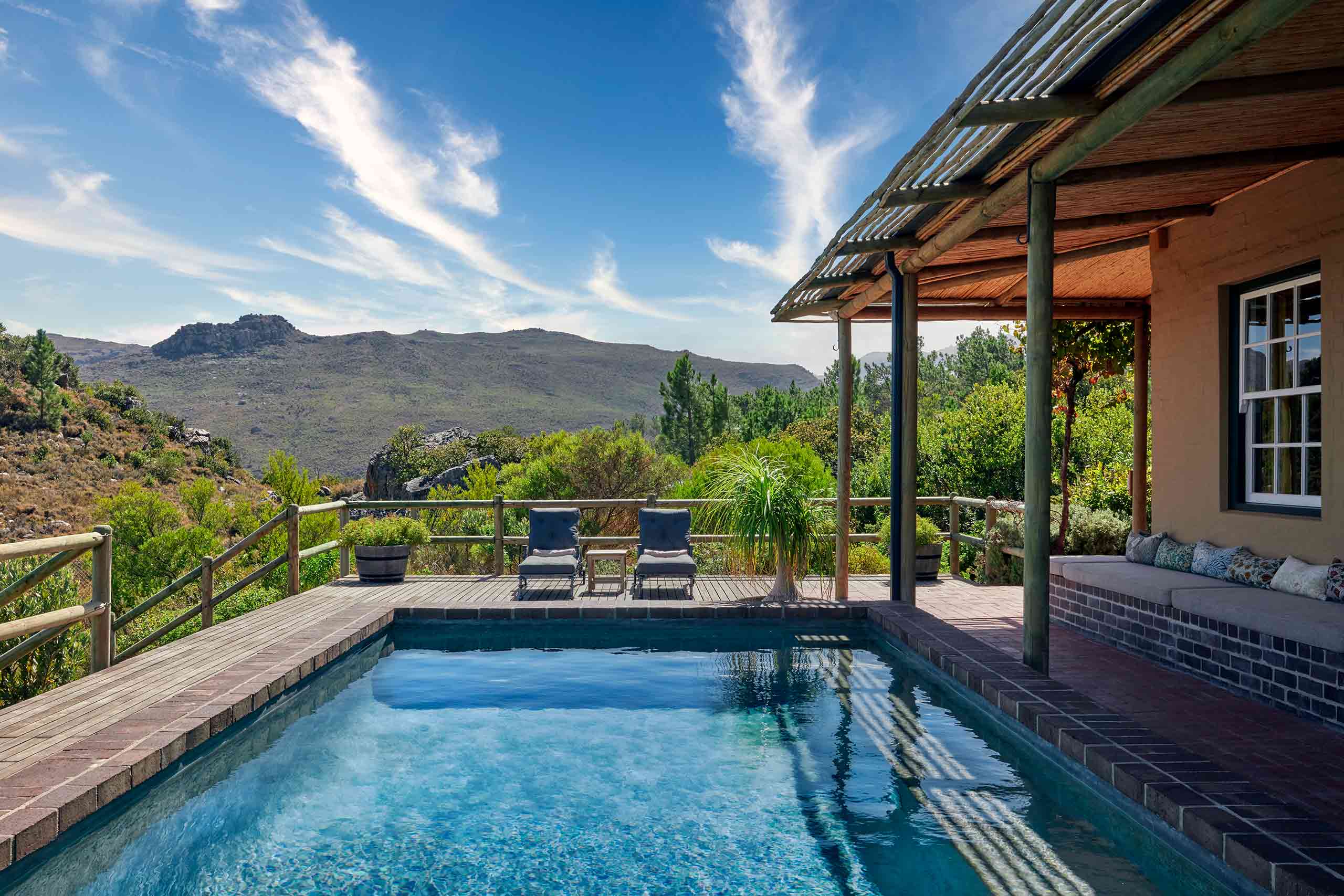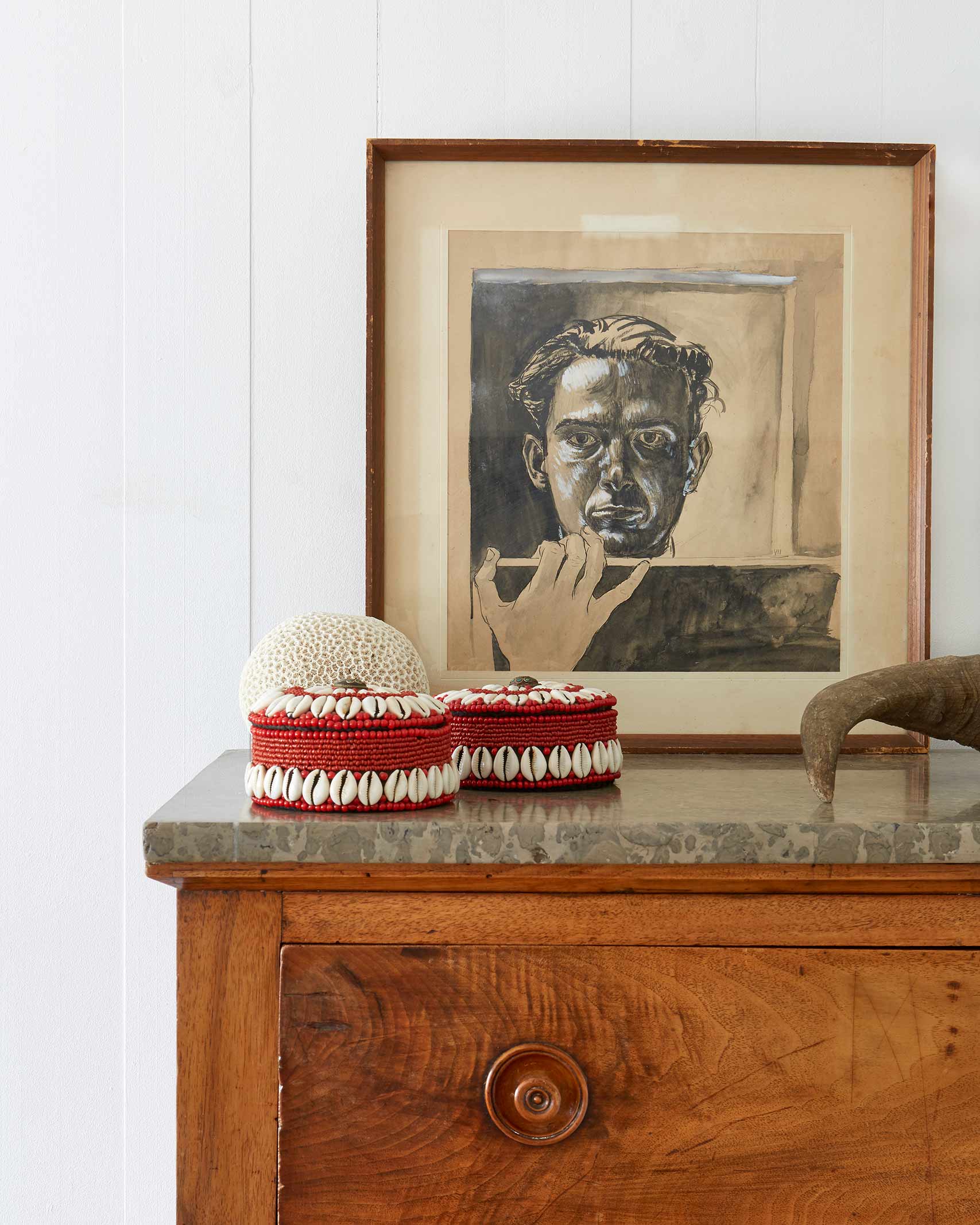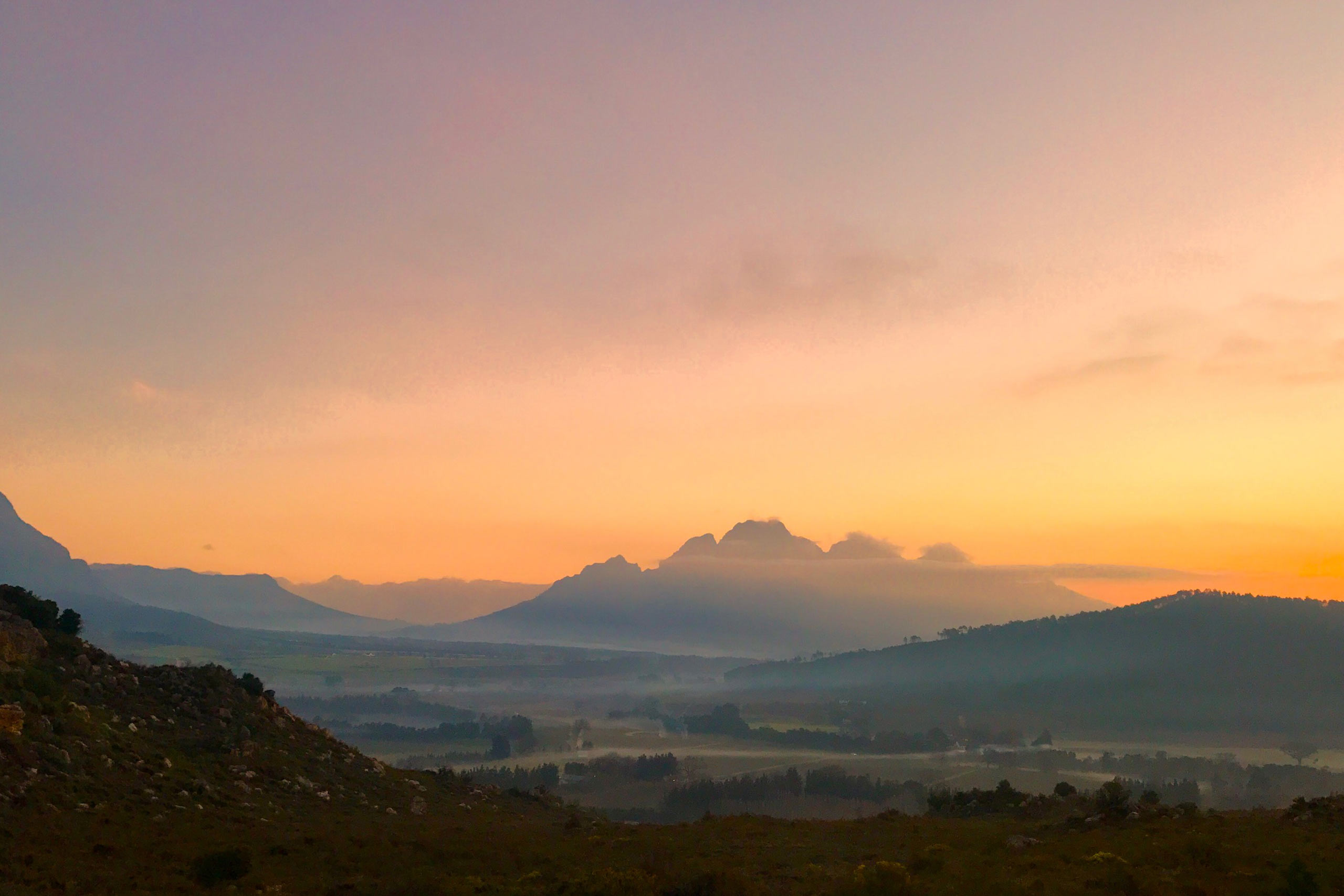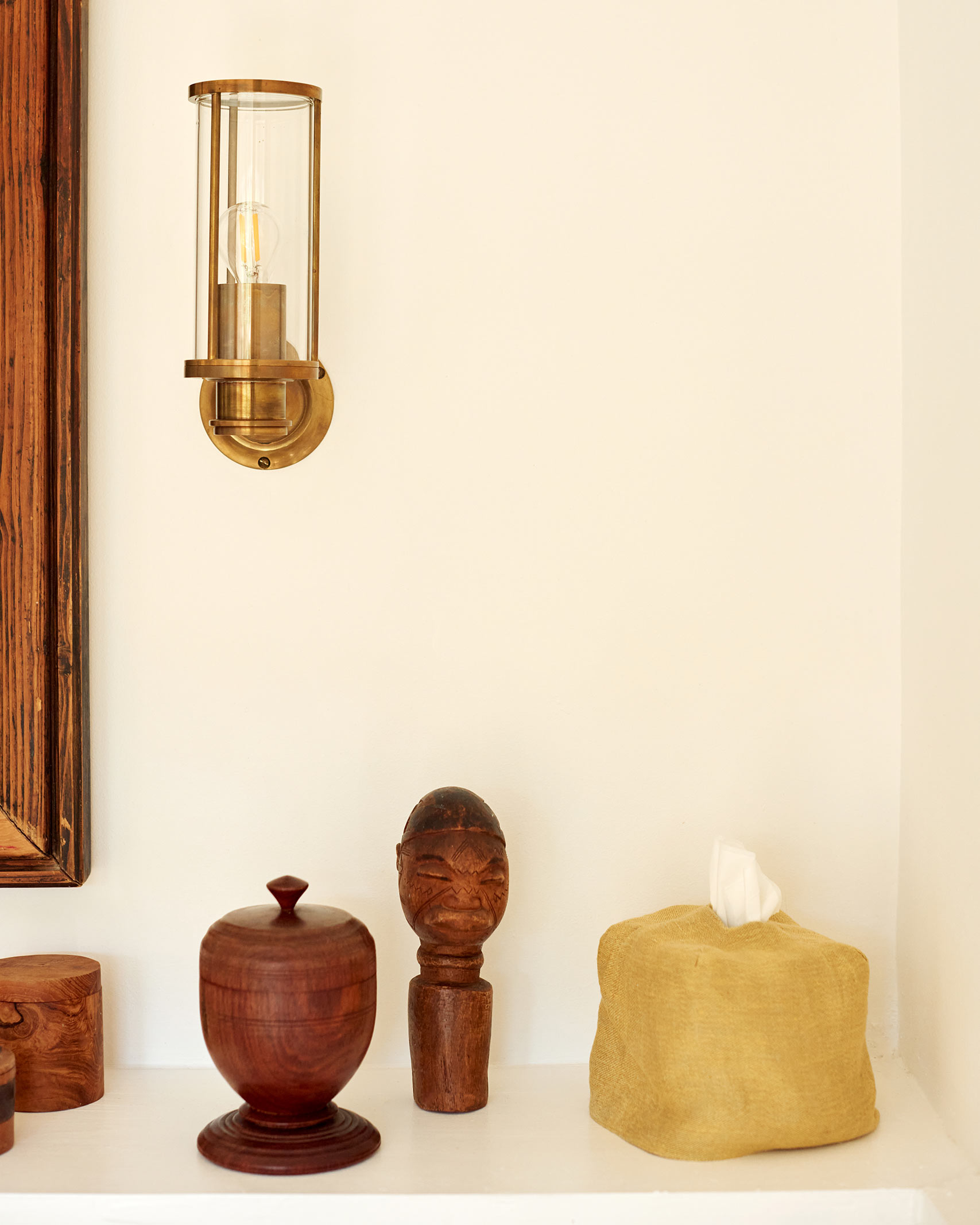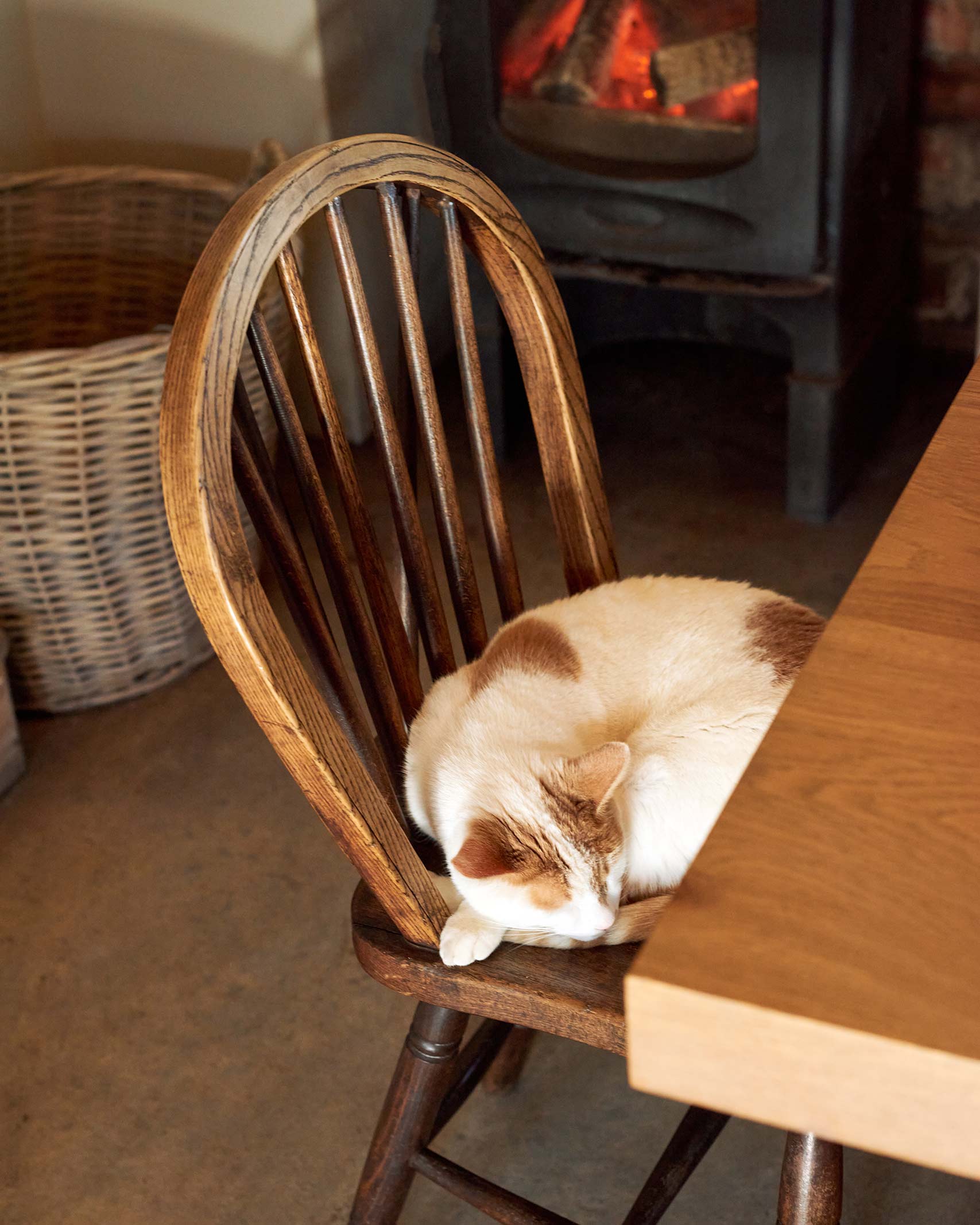That South Africa’s spellbinding Western Cape might inspire budding hoteliers isn’t surprising – but the couple behind 7 Koppies never set out to open a B&B when they first came across their Franschhoek farm. And that might just be what makes their hilltop hideaway so special.
Place your finger anywhere between Paarl, Stellenbosch and Franschhoek on a map of South Africa’s Western Cape and it won’t be far off a place to stay that’s either owned by a billionaire or occasionally dropped into dinner conversations at Manhattan’s latest ritzy hotel restaurant (and in more than one case both). It’s not necessarily a bad thing: an influx of money has made this triangle of towns in the historic Cape Winelands a luxury travel destination, with world-class hospitality standards and a social scene to match that of nearby Cape Town in internationalism, if not quite in scale.
But those who dig deeper will still find the occasional ‘insider hotel’, the kind that doesn’t seek to be something for everyone, but rather everything for someone. One of these is located just off the southern end of the R301 regional route, near its intersection with the R45, and it takes me a while to find it. Prior to my arrival, its owners had informed me not to trust Google Maps, and instead to follow their directions. It doesn’t help that there are hardly any signs along the way, although as I learn later this is intentional, and the reasons behind it come into full effect as my rental scrambles up the last few metres, finally coming to a halt outside a refurbished farm that seems to appear out of nowhere.
“We deliberately kept all the signs as they were, so you’re always wondering whether this is the right place,” explains James Jayasundera, who with his partner Marc-Ludolf von Schmarsow owns what is perhaps the most under-the-radar hideaway in the Cape Winelands: 7 Koppies. “Then your partner might say something like ‘I told you this wasn’t it. We should’ve booked the other hotel’. So you arrive feeling a bit uncertain. But when you finally enter through the gates, you say, ‘this is incredible’. We want people to be thrilled when they arrive.”
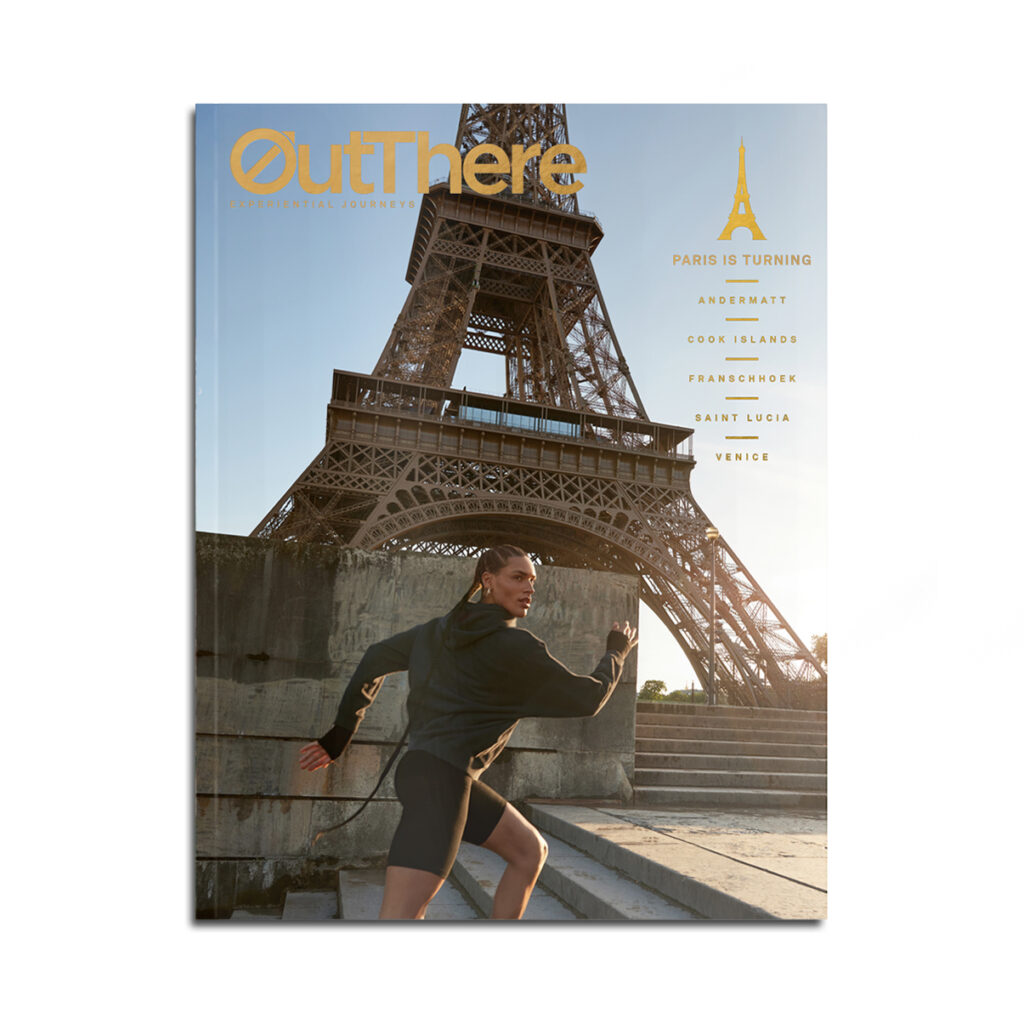
This story first appeared in The Paris is Turning Issue, available in print and digital.
Subscribe today or purchase a back copy via our online shop.
It truly is thrilling to find this place up here, not least because the farm’s many charms unfold in layers, each more evocative than the last. At first, guests lay eyes on a beautifully restored building fronted by a large natal fig overhung with air plants. Then, it’s on to a warm greeting from hosts Marc and James, followed by a first glimpse of 7 Koppies’s eclectic-cool interiors. If those don’t have you snapping away just yet, what comes next surely will: just beyond a communal kitchen and dining area, a large door with glass inserts beckons you into an adjoining outdoor area, which culminates in a 25-metre pool. Beyond that, the terrain slowly descends into Franschhoek Valley, allowing for showstopping views of the dramatic Simonsberg mountain straight ahead.
As I catch myself mumbling a hushed ‘wow’ under my breath, Marc calls me back into the kitchen. “Are you hungry? I just made pesto from herbs that were growing in the garden 20 minutes ago. Pasta and wine sound good?”
Strictly speaking, 7 Koppies is what you’d call a stylish B&B. There’s no reception desk here, and neither is there a ‘proper’ spa or restaurant.
“The house was never built as a hotel,” says James, “and the kitchen being open plan, we can’t be cooking breakfast, lunch and dinner for 30 people – the whole place would smell like a canteen. But the gardens have lots of fruit and veg, and we can offer simple pies and pastas. Most guests are actually very happy with that, because they’ve been eating at all the fancy restaurants in the Winelands, so they appreciate a simple meal for a change.”
Intrigued to stroll through said gardens, I explore 7 Koppies’s grounds post-lunch, only to find a fellow guest, clad in linen chinos, white T-shirt and a straw hat, standing between huge prickly pear cacti and pomegranate trees, a chalk stick in his hand and his eyes fixed upon a sky-blue canvas in front of him. A small radio by his side sets a scene of bees, accompanied by feel-good music, buzzing from apricot to almond trees while herbs from rosemary to tarragon scent the warm breeze.
“Sometimes, the garden falls victim to baboons and dassies,” laughs James, “which leave it in a decimated state that we wake up to. It’s part of the fun of being out here and it makes the place feel a lot more wild. Plus, the dassies have really surprised us with their penchant for spicy chillies.”
But there are other – bigger – animals in these hills, too. You’ll never encounter one, but caracals, eagle owls and even leopards call these mountains home. So, too, does William, 7 Koppies’s frisky house cat, who I can’t help but notice has a habit of falling over sideways while licking his paws in the African sun. Against his somewhat resigned protests, William is kept indoors at night, though nocturnal confinement is in his own best interest. “He’s three now, which is twice the life expectancy of cats around here. There are too many animals in these hills to whom he’s essentially an amuse-bouche,” James tells me, bursting into a rampant and contagious laughter I soon come to think of as a trademark experience of any stay here.
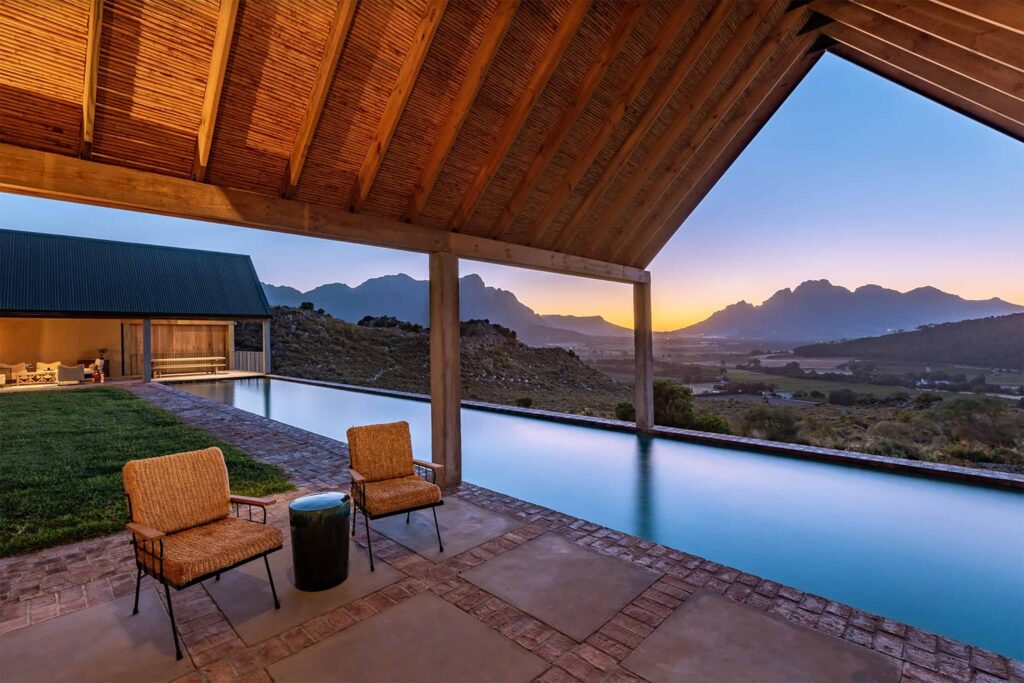
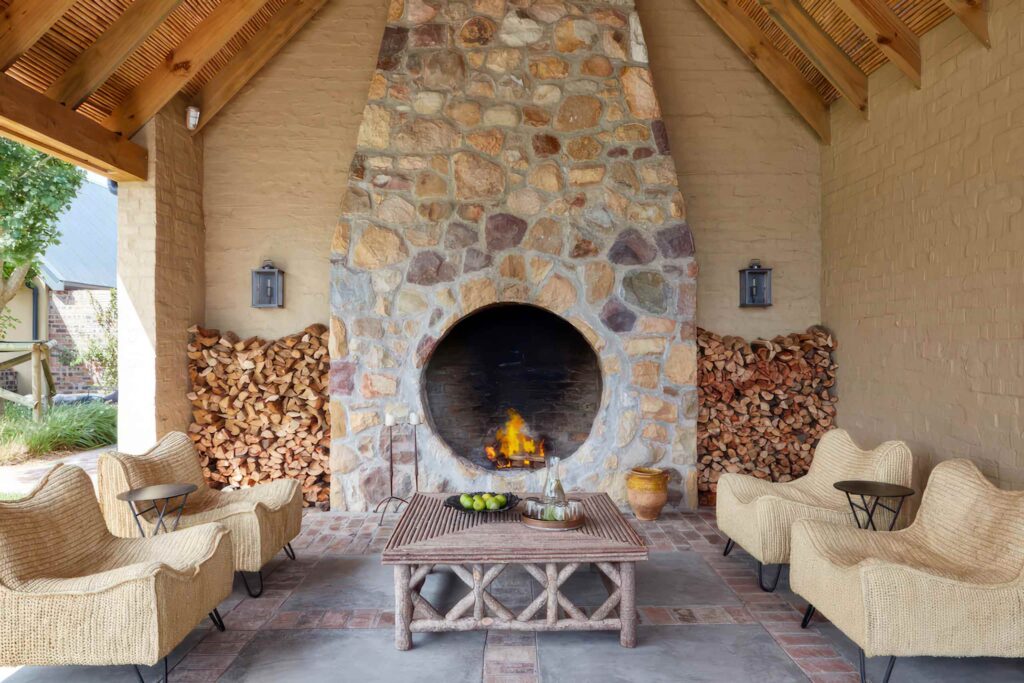
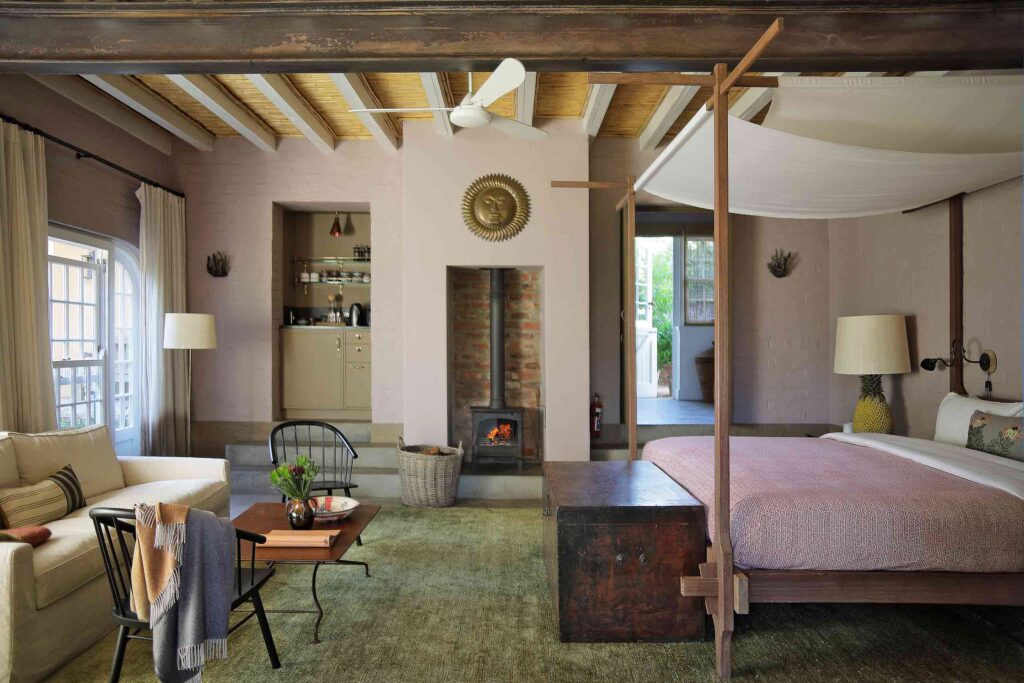
That’s not to say, however, that James and Marc are always around. The pair live in London and Munich respectively, with James being the founder of Ampersand Travel, which specialises in bespoke luxury journeys to Asia and Africa, and interior designer extraordinaire Marc running his Lumisol studio in the Bavarian capital. Still, they manage to be here about once a month and not rarely spend their own holidays at 7 Koppies. As a matter of fact, it was on their last day of a vacation to Cape Town that they first came across the property. With a few hours to kill before their return flights, the two arranged to be shown the then-out-of-service farmstead ‘just for fun’.
“You could call us hoteliers by accident,” says James, “but when we saw this place – and the view – we were amazed. I just remember thinking that if we didn’t buy the farm, we’d regret it for ever, and we didn’t want to be the kind of people who say ‘we saw this beautiful place in South Africa and really wanted to buy it, but we didn’t’. That would be the poorest opening to a conversation.”
Arguably, the pair was in a good place to take a leap, with a solid career each, and at a point in their lives (then in their 40s and early 50s) that meant they’d have plenty of time to recover from a potential mistake and learn from it.
“If you’re going to do something a little daring, this is the age to do it,” explains James as we stroll around the 50 hectares of fynbos shrubland that hold 7 Koppies in a lush embrace. “All our friends said we were crazy, but we didn’t listen to anyone. And I’m glad we didn’t.”
William, meanwhile, is always on our tail, putting an end to the lives of any insects along the winding path. Southern Africa has always been kind to James, who ran Wolwedans Lodge in neighbouring Namibia in the 1990s (“When I lived there, I used to subscribe to The Economist and Hello!. Gossip is a wonderful thing. You’ve got to be able to have a laugh, and when something’s a talking point, you need to know who’s who and what they’ve done”).
It was during this time, and on regular trips to Cape Town whenever he had two weeks off, that James came of age in the city. “I find it so inclusive here,” he says. “We were welcomed with open arms when we started working on the farm. Everyone has been extraordinarily kind and professional – our lawyers, accountants, builders and architects. We’ve done a lot here and had to learn fast, but there were no real challenges in terms of adjusting culturally. The basic traits people have here are very positive.”
It’s immediately apparent that a lot of work has gone into renovating the farm, which was previously called Koppies (meaning ‘hills’) and was in its new B&B configuration christened 7 Koppies in a nod to Rome, where both Marc and James spent parts of their childhood. Across its six rooms and suites and the separate Rockwood Cottage (which comes with a private five-metre pool, outdoor dining areas, an open-air bathtub and a South African braai barbecue), guests will find an inspired array of artworks, collectibles and natural touches that create a haptically impactful space I just want to wrap myself up in. Everything here stimulates the senses: textured carpets, rattan ceilings, sand dollars and mushroom shells, floor-to-ceiling linen curtains, shiny brace fittings against rustic bricks, crackling fireplaces in the chilly night.
“The 21st century is all about eclecticism,” Marc tells me over a verbena infusion that comes in a different-sized mug each day of my stay, piping-hot proof that 7 Koppies favours homely spontaneity over corporate hospitality. “I love mixing old and new, antique and modern. It’s the mix that makes an interior interesting and I don’t care whether something is old or new. It just has to fit.”
“Everything has to be replaceable,” adds James. “We don’t ever want to be too precious about something if it breaks.” Restraint, he says, is his favourite character trait in anyone, and it’s something the pair practised when refurbishing the farm. “When you leave the house knowing you’re wearing just enough to make an impression, but no more, that’s elegant to us. 7 Koppies is a bit like that.”
That said, some additions to the property have truly elevated it. Two pavilions on each side of the pool are reminiscent of Sri Lankan temple architecture (and the work of architect Geoffrey Bawa) and are a homage to James’s background. A solar farm is also in the works, and so is a small kitchen below the pool, which will enable the team to do some more ‘serious’ cooking, as Marc and James put it. What’s not going to change, however, is the farmstead’s small, intimate scale, and for good reason.
“Many people lead such transient lives,” says James, “travelling frequently and never even having a chance to create a home. They have a big house with some of their possessions in it, but it’s never really cosy. This is a home in a sense that a lot of people no longer have, with antiques and old books and personal things that go back multiple generations.”
The concept clearly works, with 7 Koppies seeing regular buy-outs some 10 weeks a year. When Marc and James are around, visitors initially tend to be on stellar behaviour, putting their best foot forward. But eventually – and partly because of the limited communal spaces that bring everyone together – guests (who come mostly from Britain and Germany, but increasingly from South Africa, China and the UAE) always click. Evenings on the farm are long, bottles often emptied, and nights can get wild. “It’s a good party house,” admits James, as a fellow guest, Lucy, tells of a nearby nudist wedding she’d attended the day before, sending roars of laughter around the dinner table. “Has anyone else noticed,” begins James, “that the music has changed since yesterday? First Madonna, now George Michael. I think Alexa overheard us and realised we had a lot of gays in the house today.” More laughter ensues.
It shouldn’t be surprising that a place dripping in style and with a genuine under-the-radar appeal would attract a rather fabulous, in-the-know smart set, too. Despite 7 Koppies being a comparatively humble place to stay by Winelands standards, I’m treated to many a juicy tidbit that might have you thinking you’re among society’s upper echelons. From ‘the King of Jordan once invited me on to his plane’, to ‘I went to the maharajah’s wedding… well, all 10 of them, in 10 different palaces…’ and, my personal favourite, ‘not to be rude… I went to her new place in Paris. It’s tasteful, but… safe’ (a shockwave of startled horror sweeps across the table before a fellow guest from LA finally breaks the silence, shaking her head in disbelief. ‘Gosh.’).
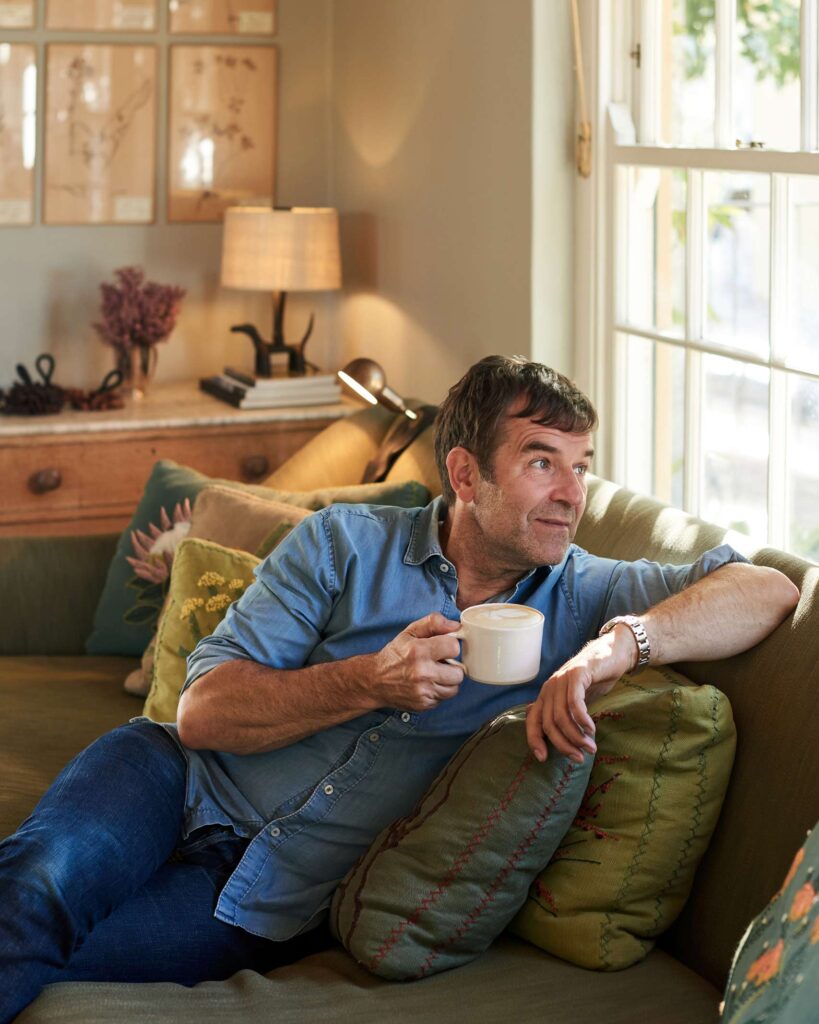
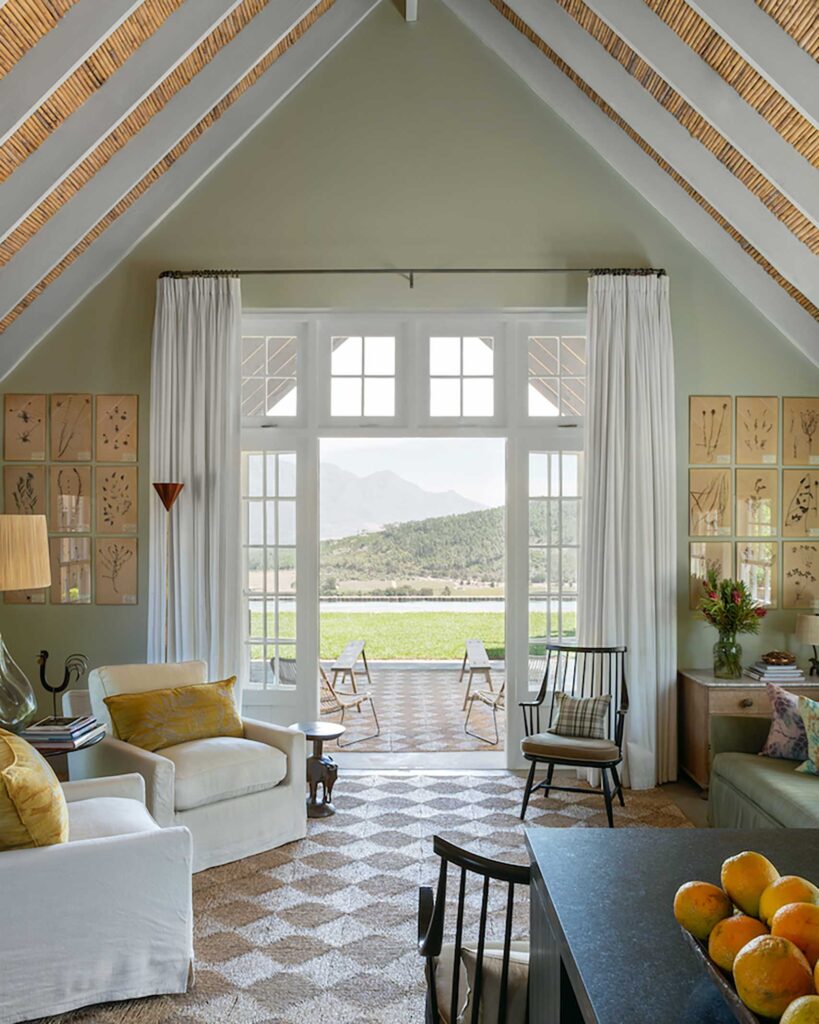
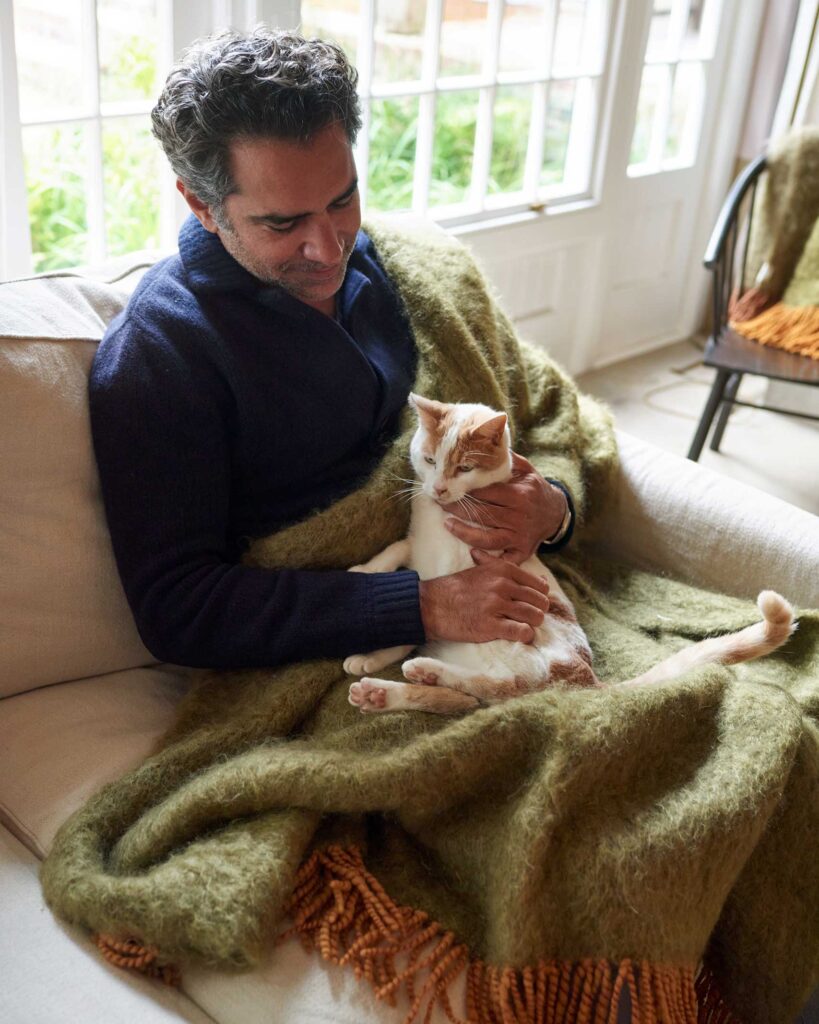
What’s so wonderful about this is that these types of visitor – some of whom are without a doubt personal friends of Marc’s and James’s – somehow fit in perfectly with the more subdued elderly couple who have come to ride Franschhoek’s famous Wine Tram, and the adventurous youngsters planning to climb the surrounding mountains. But the pair insist that no one ever feels obliged to socialise if they don’t want to.
“At the end of the day,” remarks James, “it’s your holiday and you do what you feel like doing. But people tend to spend time and have a laugh with others here.”
There’s even talk of staging a hiking holiday at 7 Koppies, to bring people together for what its owners loosely refer to as a wellness retreat. Massages can be easily arranged at the property, and a sauna was recently installed near the pool, but don’t expect a cryo-chamber or a medical spa.
“We’re thinking of doing walks with a proper hiking guide and in the evenings guests will return to the farm for massages and calorie-controlled meals with non-alcoholic drinks,” explains James. “I’m not a fan of overly formalised retreats. There’s nothing more health-inducing than walking and talking, being outdoors and in the company of others. You become too focused on yourself otherwise, especially seeing that the person you’re trying to escape from is often yourself.”
This type of vacation might not be for everyone, of course. And, moreover, 7 Koppies isn’t, either. Many a traveller will make a beeline for the Winelands’ multitude of five-starred establishments, where the luxuries of private concierges and fine dining await (not to mention less idiosyncratic signposting). But then, they’ll miss out on the build-up of suspense upon arrival, on the library of lived memories in the shape of Marc’s collection of antiques and objets trouvés, and on James’s bottomless repertoire of perfectly delicious and not rarely improper one-liners. I, for one, find that 7 Koppies pulls off the rather impressive feat of doing an excellent and intuitive job of providing hospitality without ever asking to be taken too seriously.
“We’re not a big-brand resort,” says James. “We don’t do a different type of juice for each guest. It’s freshly squeezed orange juice and that’s it. At the end of the day, this place is all about us. There’s an element of humour in everything we do. It’s not for everyone and it’s not about making it for everyone. But then, this kind of destination attracts a certain type of traveller, who’s happy to step into our world to try something new. And our gates are always open. You just have to make it up the hill.”
Photography by Nicola Katie, Henrique Wilding and courtesy of 7 Koppies


